#it's because *most* people are already fundamentally Like That to begin with
Explore tagged Tumblr posts
Text
i really love how intensely Mirabelle reacts to act 5 Siffrin botched friendquest.
Isabeau is mostly operating out of concern and, eventually, hurt. he already knows something’s up before Siffrin gets to him. he knows something truly awful must be wrong for Siffrin to be lashing out like they are, and as soon as he can’t handle the situation anymore, he leaves and asks (with strained cheer) for time apart to cool off.
most of Bonnie’s anger comes from being upset and afraid that Siffrin would willingly put themself in danger for no reason, when that’s exactly why they’ve been so unsettled since the eye incident. they hate that Siffrin values their own life so little, they hate that they’re the cause of any pain or loss for him, and here he is, putting himself in that situation AGAIN. on purpose. it’s loud and explosive, but it’s familiar, too, being “hated” by Bonnie for this reason.
Odile pushes, and keeps pushing, until her concern overwhelms Siffrin and they strike where they know she’s most vulnerable. she gets physical, just for a moment, grabbing his collar before controlling herself and letting go. her fury shuts down into cold detachment, and she walks away.
but Mirabelle—dear, sweet, gentle, loving Mirabelle, “the most wonderful being on earth,” with her secret “ruthless side” that largely involves lightly badmouthing people behind their backs and then apologizing—slaps them. immediately.
and then COMPLETELY RENOUNCES THEIR FRIENDSHIP.
not just “we’re not friends anymore,” but “we were never friends in the first place.”
that’s!!! pretty extreme!!!!
of course, she ALSO starts by asking what’s wrong. something must have happened for him to act like this. but as soon as Siffrin brushes her off, she jumps past that line of questioning and dives headfirst into re-evaluating everything she thought she knew about them as a a person.
if he could say something like that to her and not see anything wrong with it, then she was wrong to treat him as a friend, wrong to read camaraderie into his teasing, wrong to think they must care about them all under their aloof demeanor.
that’s how Mirabelle phrases it—“I was wrong about you”—but i think that there’s a hidden layer of I was right about you, too.
she talks about the way they tease her like she had to convince herself that he was doing it in a friendly way. she says they talk like they “know better than her” like that’s a thought she’s had for a LONG time.
“Always soooo mysterious, Siffrin, always talking as if you're better than me! As if you know me!!! But you don't, Siffrin!!! You're just as lost and useless as I am!!! So stop!!! Talking!!! As if you know me!!!!!!”
none of this comes across as a new, sudden way to view Siffrin for her. it doesn’t shock or confuse her. it makes her angry, defensive, almost like she was waiting for something like this to happen at some point. the feeling of resentment, frustration, jealousy, being patronized and condescended to—this is something she’s been actively pushing down and rejecting this entire time, but they’ve given her ample reason for it all to boil to the surface. violently.
Mirabelle’s kindness is not inherent or easy. it’s a choice she’s making. she treats Siffrin warmly because she gives him the benefit of the doubt—refusing to act based on anxiety-fueled, cynical speculation, and reassuring herself that his actions are driven by care and friendship even if she can’t quite see it.
“I was wrong about you” doesn’t mean she always and without question believed them to be a fundamentally kind, caring person from the beginning—it’s that her first, colder instincts were right, and she was wrong to convince herself otherwise.
never mind that she asked what was wrong at first. she barely gives them time to speak in their own defense, to explain what they really meant by what they said. all of her suppressed doubts and frustrations are getting aired out now, now that all the trust she’d so deliberately placed in him has been betrayed. her pain feels bigger than this singular moment, so when she hurts him back, she makes sure it extends back through the entirety of their relationship for him, too.
“You're awful. You're not my friend, not my ally, not anything. You never were.”
like the others, she goes back to the clocktower and tells Siffrin not to come back until later. but there’s a finality to the way she ends this confrontation that isn’t quite there with the others. Isabeau and Odile reach their breaking point and remove themselves from the situation, asking for space to cool off but still somewhat leaving the door open for Siffrin to tell them what’s really going on at some point. Mirabelle is the only one who tries to fully cut ties—after everything else she says, her “I don’t want to see you until tonight” reads to me somewhat as “I don’t want to see you anymore unless I have to.”
I can’t wait to never see you again.
even back at the clocktower, Mirabelle doesn’t really defend Siffrin’s place in the party when Odile suggests leaving them behind out of concern for their trustworthiness on the most important day of the journey. Isabeau and Bonnie protest out of sentimentality and faith in Siffrin’s abilities and connection to them, and Mirabelle agrees, but…
“I agree, but... B-But would he even agree to come with us, still? Maybe they won't even come back tonight...”
she doesn’t say much outside of that. maybe the stutter and hesitation here are signs of regret about how things happened, but she lacks Isabeau and Bonnie’s confidence that Siffrin even wants to come back to them in the first place. she doesn’t trust that their bond was real anymore. maybe it never was in the first place, or maybe she broke whatever was there herself.
and she’s still mad when they finally catch up to Siffrin at the King! and she makes sure Siffrin knows that—after saving them, assuring him that he no longer needs to fight, that they’re all there for him. she still cares, of course she still cares—she’s still hurt, too, but they can figure that part out once there’s less world-ending stuff going on.
she’s the first to say that they all reserve the right to still be angry at Siffrin later—and that they’ve already forgiven him.
she’s also the first to say we want to stay with you, too. it’s not just you.
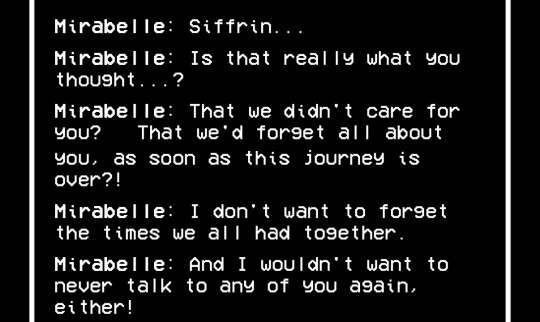
she was wrong! she thought they didn’t care but they care so much, it’s overwhelming, it’s world-ending.
i think she’s gonna be wallowing in guilt post-canon the moment she remembers what she said and did TO SIFFRIN and not just what Siffrin said to her. especially now that she knows Siffrin’s exact hangups, and especially especially if she figures out what Siffrin was trying to say.
they put themself through hell out of loneliness and fear that none of the others cared about him the way he cared about them, he was going insane from repetition and exhaustion and hunger and trying to keep them all safe and together, and all they did in the midst of all that was say something kind of mean to her one time (that turned out to not even be MEANT to be mean it was supposed to be HELPFUL they just SAID IT ALL WRONG) and she SLAPPED THEM? and told him that they WEREN’T FRIENDS AT ALL??? how could she!!! she should have known better!! what they said hurt a lot but still!!!
so when they eventually manage to try to talk about it, they end up almost in, like, a guilt competition.
Mirabelle apologizing for how she reacted, that she shouldn’t have yelled or hit him, that she doesn’t want to be the kind of person who acts that way out of anger and she’s sorry that she made Siffrin expect that reaction from her, she should have known better and believed in him more and they only messed up like that because they were losing their mind in a time loop but what’s HER excuse—
and Siffrin going nononono stop I deserved it—(HUH DON’T SAY THAT NO YOU DIDN’T)—and that he should never have said such awful things to her, ever, and she was under so much pressure already with the weight of the country and everyone’s lives and futures and her religion and their whole party counting on her to do this impossible task because she’s the only one who can, all this unbearable expectation and hope crushing her, and they KNEW that but they thought they could skip to the ending as though her feelings didn’t matter at all, like helping her wasn’t as important as saving a little time—
until they’re just. in tears together, apologizing for all the horrible things they did in between complimenting each other’s strength and kindness and resilience and how much they admire each other and saying that no, everything you did was completely understandable, actually, the only one who sucks here is me. which neither of them will accept coming from the other!!
they’re so similar, in ways they couldn’t really understand, before.
warm, affectionate, perfect Mirabelle, the resolute hero, a beacon of compassion and hope for all those around her, who wears her heart on her sleeve, her fear making her courage shine all the brighter—nothing like the insignificant, forgettable Siffrin, too terrified to be known, too fragile to touch, too selfish and disgusting to bear letting go.
cool, mysterious, unflappable Siffrin, the worldly traveler, as charming and silly as they are confident and skilled, who brushed off losing an eye like it was nothing, accepting the risks of this journey with barely more than a shrug—nothing like the anxious, stagnant, undeserving Mirabelle, a fraud and a nobody crumbling under the weight of a mission too important to be entrusted to someone like her, doubting herself, doubting her friends, doubting her mentor, doubting her faith, too weak and brittle to bend and change the way the world needs her to without breaking.
not worth bothering others with their problems. they should be able to handle this alone. stay positive, stay calm. breathe in, and out.
they’ll struggle with it, still—the hiding, the minimizing—but now, they understand each other a little better. they can hold each other accountable for what they leave unsaid.
it’ll get easier, eventually. they have plenty of time.
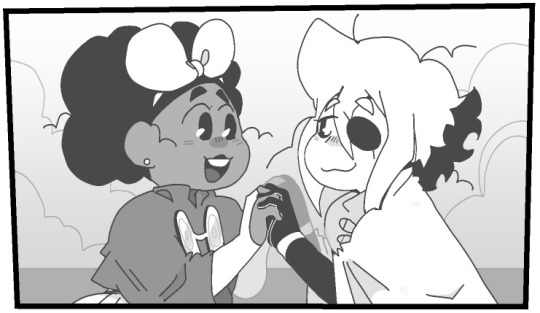
#i!!! don’t know how to end posts!#this was supposed to be about One Quick Thought and then i just. kept going.#it’s REALLY LONG. SORRY?#some of this is a rehash of what i said in the mirabelle edition loop hangout post#i didn’t want to repeat EVERYTHING though so. no prologue discussion this time#isat#isat spoilers#in stars and time#in stars and time spoilers#isat mirabelle#isat siffrin#mypost#isat meta#mirasif qpr#it makes me wonder what other negative impressions she’s harboring about the others#surely siffrin isn’t the only one that she has twisted up somewhat in her head in ways that she has to talk herself out of#it’s a very anxiety-based behavior. making up worst-case stories in your head about yourself and other people#and having to remind yourself that those worst cases aren’t necessarily reality#the most obvious (to me) in the party would be comparing herself to Isabeau and feeling Some Type of Way about finding herself lacking#even if no one else sees it like that.#he’s strong he’s brave he’s reliable he’s heroic—he’s COMFORTABLE WITH CHANGE……#meanwhile she’s just!!! same old mirabelle!!!!!#incapable of changing in so many ways that seem so easy for everyone else! what’s wrong with her that she can’t!!!!#if it’s not clear absolutely none of this is like. critical or disparaging of mirabelle. i fucking adore her.#and her handling this the absolute Worst out of all of them (Bonnie included!) is part of that#LET HER BE MESSYYYYYY#btw for those familiar i’m picturing the guilt competition very much in Steven Vs Amethyst (steven universe) style
808 notes
·
View notes
Text
3.5e: The Prestige Classes of the Complete Warrior
The Complete Warrior was a book of all time. All the Complete books had their virtues and their vices, but the Complete Warrior was one of the first attempts by the designers in the lifespan of 3.5 to try and introduce some juice to the least powerful part of the game that was also, fundamentally, the most vital and popular. People love their human fighters, they love swords and they love archery and they love doing the cool fantasy things that wizards don’t do.
The Complete Warrior was a book that brought with it tools for the non-spellcaster, and how good or bad a job it did of it notwithstanding, one of the things it brought was a host of prestige classes. A prestige class is something like a Paragon path, but more retrictive and harder to implement. You need to fulfill requirements to get into it, and then each one gives you powers or benefits at irregular intervals.
I thought it’d be fun to look at them.
And then I found there were 30 of them.
Be pretty silly to look at all 30 of them, right? Pretty silly to take all these dusty archaic game pieces and one-by-one them to a general audience and discuss their design limitations or the idea of class fantasy, right?
Have to be a bit of a goober for that?
Bear Warrior
A barbarian whose rage is so potent they turn into a bear.
The Bear Warrior is a great place to start the list. It is 100% perfectly fine; you give up late-game Barbarian perks, your skills aren’t quite the same, and in exchange you get to do something that is new and cool but builds on what you were already going to do. Anything you ask a Barbarian to do, a Bear Warrior can do probably do about as well, but, and this is important, the Bear Warrior gets to transform into a big fighting bear.
Class fantasy fulfilled, mechanically reasonable, and doesn’t demonstrate an ignorance of the game rules.
Bladesinger
An artful melee spellcaster who can cast spells while fighting.
3.5 D&D had a longstanding puzzle for optimisers about how to make a type of character we called a ‘gish’ – a fighting spellcaster that could cast high-level spells, and fight in combat. The idea was a novel one that still appeals to me, since the power to do either side is going to be consumed by the things you need to feed the other half. The Bladesinger is one of many, many prestige classes in this tradition, and it’s actually decent.
This fulfills the class fantasy of being an elf, with a sword, casting spells and fighting at the same time. The name ‘Bladesinger’ has some truly broken history (back in 2e it was amazing), and this version carries that name, doesn’t make unreasonable demands of you to get access to it and delivers on the theme.
I kind of think of the Bladesinger now as a sort of robust middle-of-the-road gish class. It will do everything you need, it won’t ask you to do anything weird to get it, and while there’s more powerful and more flexible versions, there’s nothing wrong about using it and you get to do something most other gishes don’t (cheat the action economy).
Cavalier
A mounted knight who is good at being a mounted knight.
Here’s where we begin one of the first real drive-into-a-ditch problems of the Complete Warrior. See, Paladins are appealing to people who want to fight in melee, and that means there are some prestige options here for improving Paladins. This one, the Cavalier, is really only good if you are a Paladin, because mounted combat without a Paladin’s special mount options involves transporting around a mundane animal with maybe thirty hit points that can be crisped by a fireball.
What you get out of this class when you jump into is, uh, being a good mounted combatant. Like Paladins mostly already are. I want to give this modest praise for specialising, but the problem is, the Paladin who doesn’t take this route eventually gets Holy Sword, which is really amazing for charging cavalry Paladins, and this class doesn’t get Holy Sword.
It can get Holy Sword through wands I guess?
Dark Hunter
A hunter, but roguey.
Hey, hang on, hold this for a second.
Darkwood Stalker
A rogue, but huntery.
Alright, back. The Darkwood Stalker and Dark Hunter are close to each other in both what they’re doing and how worthless they are. They are both melee combatants that want to be good at stealth and reward that stealth with combat options that make you better from stealth, using the time honoured tradition of Sneak Attack. Know what else gets Sneak Attack? The Rogue, and the Rogue is a standard class that doesn’t need prestige class requirements. It’s also really good. In fact if you want to, taking a Rogue and specialising to make it tougher and better at melee will yield a better version of both of these prestige classes than sticking them onto a Ranger or Fighter or whatever ever could.
Oh, and the Darkwood Stalker brings in race-specific combat abilities, which is uh, bad. It gets a death attack which is terrible since it requires three turns of anticipation, only targets orcs, and gives a save-or-die. It is an ability whose upside is probably not as good as three multi-turn attacks, and it’s your capstone ability for don’t bother.
Bonus: When you get it, wizards have already had access to a spell that can save-or-die any target, even if it’s not an orc, and they get it at level nine.
Dervish
A fleet-footed combat dancer who moves through a battlefield to a rhythm that makes them untouchably dangerous.
The Dervish is a really cool class fantasy, it lets you specialise in something most fighters want, and it presents you with an interesting puzzle to solve if you want to use it well. Basically, you can attack and move, and you can do more attacks and more moves, but you have to be able to move into a new square every time, and you can’t move back into the last square you were in.
To maximise your Dervishing you need to map through a combat and the result is both effective and satisfying. Amazing class, absolutely worth the effort to get into it, and it makes you good at either enormous targets with uncomplicated terrain around them (like giants and dragons) or really widely spread out weak targets. Thing is, there’s a lot more than just those two options, and it gives you room to screw up and get yourself put somewhere really dangerous if you’re reckless.
Shame about the slightly racialised name.
Drunken Master
You’ve seen that guy in a Jackie Chan movie? Yeah, like that!
Oh boy, speaking of racialised names.
The Drunken Master is a monk prestige class that gives the monk the ability to fight with improvised weapons. This is something that the monk could already do through narrative description (hitting people into things like benches, tables, and ladders) but don’t worry, the Drunken Master is here to let you do that exact thing, but not as well.
This class is fine, but it’s not better than the base class it comes from.
Exotic Weapon Master
Well you tell me I shouldn’t pick up three exotic weapon proficiencies, but what if I did, mom?
This class is a big pile of special options but isn’t worth it. Nothing it unlocks is as good as you can get from other prestige classes that are less demanding. Exotic weapons are, largely, not worth using, since they are weapons and therefore they are all balanced around not making longswords and two-handed swords redundant, and that means that the best you can do is the Jovar or Bastard Sword, which are the same thing but slightly better. All the other fancy cool looking weapons fall behind on the math, and in some cases by a lot.
Remember, the tonfa is a club and it’s an ‘exotic weapon’ in this system.
This is a bunch of feats that aren’t good enough, in a trenchcoat, and should have been a modal feat instead.
Eye of Gruumsh
Hating elves and depth perception is a personality.
Stick your eye out! Become an Eye of Gruumsh! Get the special powers of Being Good At Fighting, which you already were!
Look, sometimes something exists to be a flavour option and then the designer gives up on making it so there’s any reason to want that flavour. This is what sometimes gets called an NPC prestige class; something that only exists so NPCs can take it to make them more interesting or specific as a combat encounter for players. You have to play a bad heritage to get into this class, then you have to focus on a bad weapon, and then you have to impose a material penalty on yourself, and then with all that, you get a perk that’s not useful as a player.
Bonus, the class is racist. Its bonuses are focused on being better at fighting elves.
Frenzied Berserker
The fantasy of raging so hard you hit teammates with an actual payoff.
The first big flaring red light of ‘this is a problem’ class in the book, though not necessarily for reasons you might imagine. The Frenzied Berserker is an extremely strong melee combatant whose drawback is that other players who don’t respect what you do can get hurt.
This is a bummer.
For them.
This is a rare example of a prestige class that is, ostensibly, delivering on what it promises and what it delivers is worth waiting for. It’s for people who want to play an out-of-control rager who is a danger to themselves and others. Where it gets weird is that by ignoring death rules, it can do some odd things with a bucket of water if you’re the kind of DM who doesn’t hold the reigns tight enough to say ‘I know the rules say you can return to 0 hp by sticking your head in a bucket, Dave, but we both know you know that’s stupid.’
Gnome Giant-Slayer
How do we compensate gnomes for being awful at fighting the things they should want to fight all the time?
Structurally, it is weird that the Complete Warrior got this when the gnome handbook, Races of Stone could have used it more. Then again, saying anyone could use this is overstating it, because nobody needed it. This is a prestige class about making one specific type of small character better at fighting big things, which seems a skillset that should be generalised and not at all related to a specific heritage.
This is also something like the fourth prestige class so far that wants the feat Spring Attack. It’s almost like that’s the only thing fighters can do that the designers can point to as a desireable prerequisite.
Halfling Outrider
The triple union of horse girl, good boy, and hobbit superiority.
I’ve written about this one before! The Halfling Outrider is part of the Supermount design, which didn’t exist until after this book was made. It’s a perfectly good class without that, and it does something the Cavalier doesn’t do – in that it’s something you can get into from multiple points and provides a reason to do so.
Hulking Hurler
Want to throw things at people? Like, really big things?
Okay, deep breath.
The Hulking Hurler is one of the most broken things in this book, and I mean broken as in ‘rules don’t work this way normally.’ The Hulking Hurler gets the ability to throw objects as improvised weapons, which then deals damage based not on the object’s design, but rather based on the object’s weight, and that’s a stat that scales up.
A 400 pound object, when flung, deals 5d6 damage. If it’s sharp, like a stalactite or jagged rock, it’s doubled, meaning that you’re flinging 10d6 damage at level 7. For a Hulking Hurler to fling one of those you need a strength of around 23, and it goes up from here. There are magic items for improving your carrying capacity, and for storing large items. Thing is, this number here is where the normal table maxes out, and carrying capacity and object weight damage do not scale up in the same way. When your strength goes 10 times over the cap in the book (so if you can hit 39), your carrying capacity quadrouples, and the damage goes up by 1d6 per 200 pounds. You start needing to do algebra homework on your damage dealing.
This gets ridiculous combined with the War Hulk prestige class from the Miniatures Handbook, but it’s worth remembering that even without that combo, this is still introducing into one whole combat economy (hit points and strength mods) another unrelated one (weight capacity).
Hunter of the Dead
A holy warrior that casts spells and purges the undead. Paladin? No, shh.
Sometimes a prestige class has a clear conceptual flavour but not a good way to deliver on it. This, for example, should probably just be a Paladin variant.
Invisible Blade
A sneaky stealthy fighter who fights with two daggers.
There’s a body of classes that are about giving you an existing feature, but worse. In this case, the class gives you sneak attack, but only with daggers, and then a way to surrender that sneak attack for a worse effect. Cool idea, but piss-poor execution meaning it’s just not worth it to care. Giving up 1d6 sneak attack for 1 point damage over time effect means that you have to wait 3 rounds to, on average, catch up with just sneak attacking.
Also, the Invisible Blade can add its intelligence to its AC, but that bonus is capped by its class level.
Essentially, this class has some cool ideas (bleeding sneak attacks and nimble defenses) but made sure to make them suck in case people got too eager to play with them. After all, this is the fighter book, not a wizard book.
Justiciar
You’re a fucking cop.
The ability to deal nonlethal safely (kinda nice, maybe worth a feat with some other perk), and then improvements to tying people up mid-combat, presenting a unique form of control that trades turns of damage knocking someone out for a few turns of grappling them in the hopes they then won’t escape artist or strength their way out of your restraints.
It’s a gimmick.
It’s probably a gimmick for an NPC.
If you’re really into the idea of dealing nonlethal damage, unarmed combat has plenty of support. The sap isn’t terrible. Hell, know how else you can do nonlethal damage? With the Merciful Enchantment from the Dungeonmaster’s Guide, which lets you inflict nonlethal safely and freely. and you can just buy it with gold.
Crippling strike is cool, but it’s not worth the investment of this class. A point of stat damage is also, something you can put on a weapon enchantment.
Also you’re a cop.
Kensai
Spiritually attuned weapon masters who want to express a really cool element of their weapon.
It’s kind of embarrassing how mystical this one has to be to justify what it is.
The Kensai is good at their weapon. It’s not always a sword, but this is 3.5, if you care about weapons, you care about swords. The Kensai is overwhelmingly going to be about doing a good job with its sword. The Kensai can spend experience to improve their sword, customising it without ever having to hand it to a wizard, and, spent right, this can be useful to bust through economy barriers. Depends on how your DM wants to handle XP I suppose.
Anyway, the Kensai also gets some cool abilities like using a concentration check to improve their body or transfer perks to allies, or do cool things with their attacks. It’s a good system and it casts its shadow onto 4th edition’s encounter and daily combat powers, which of course, nobody before 4e knew anything about.
Knight of the Chalice
A holy warrior that casts spells and purges demons. Paladin? No, shh.
Sometimes a prestige class has a clear conceptual flavour but not a good way to deliver on – hey wait I said this already. But it’s true! It’s a more specialised Paladin that doesn’t pay out worth the effort.
Look, demon hunting Paladin wannabes. If you want to attack outsiders, if you want your powers to be better at hurting outsiders, don’t look at your shitty spellcasting. Get a weapon and cast Holy Sword on it.
Knight Protector
A knight, who tries to protect people.
This is largely just alright, but it is important that this class is trying out ideas for aggro management that would become important in 4e when they were put in place more structurally.
Master Thrower
A thrower who is good at it.
Absolute piss.
This is here to make throwing weapons good, because throwing weapons are good in fantasy fiction because throwing weapons looks cool in fantasy movies. But the game system is not set up for that, because throwing weapons aren’t one of the chosen good types of weapons to do, like a longsword.
If you want to attack things at range, a lot, with a cool weapon nobody’s noticing, play a cleric, get into archery, and make your weapon invisible. The class fantasy here is obvious, and the delivery is terrible, but don’t worry, the alternative is also bad.
Master of the Unseen Hand
The powerful urge to use telekinesis to smash people into walls like a big splatty hand.
Hello, wizard prestige class, what are you doing here?
Well I know what you’re doing here, you’re trying to make something wizardy that feels fighty. The Master of the Unseen Hand gets to use the Telekinesis power and use it like a weapon at range. That’s really cool, and lets you do things like pick people up and throw them out of combat so hard they leave their boots behind (as per the class fantasy art). The way it works is a bit wonky, so talk to your DM ahead of time about whether it works the way it states it works or the way it seems to want to work.
You can even do something cool with this one! You wanna know how? It involves your character taking on levels of Savage Progression as a ghost.
Want to be good at this prestige class? Just die!
Mindspy
A spy, for minds, because high concept is hard.
What the hell is this doing here.
The Mindspy is an inexplicable rogue class sitting in the fighter book because I guess we needed some good space filler, to go along with the Cavalier, Hunter of the Dead and Knight of the Chalice.
Nature’s Warrior
A dangerous form-shifting warrior that stalks the woods and uses the forms of animals to attack its foes.
A class for augmenting wildshape, one of the best and most broken abilities the Druid has access to. Druids advance their wildshape by levelling up as Druid, and doing so also brings with it all the Druidic spellcasting and the other class abilities they get, which is pretty good and cool, even if you don’t get more base attack bonus. You have to ask yourself if you’d rather iterate one attack or get the full monster attack pattern that a bear or smilodon gets.
Point is, if you can wildshape, you wanna stay in the best class in the game for wildshape.
Still, it’s potentially useful for a ranger that wildshapes.
Occult Slayer
Wizards hate him, because of this one weird trick.
Noticing that wizards were better than all melee combatants, some classes were designed like competing organisms in an ecosystem. This is a fighter who is meant to be better at fighting wizards, which would scare wizards a lot if they had to ever care about things that made saving throws when they could just impose a bunch of negative levels with a level 4 spell.
It’s very hard to compete with an apex predator because they’re apexes for a reason. What a fighter could do is tackle a wizard with a grapple, but that might not work more than once. You’d need to be really good at grappling.
Order of the Bow Initiate
A kind of archery monk.
One of many classes that imagines swapping multiple attacks for single bigger attack is good. Since it doesn’t use skirmish or sneak attack (which both can be multiplied), and its overall damage output is extra d8s instead of extra d8s+all bonuses, it’s only good for overwhelming enormous damage resistance, which doesn’t exist in 3.5.
Unless you’re trying to shoot your way through something with hardness.
Basically, this is the class for shooting a castle wall to death, and that would be cool as hell, but nobody wants to do that. It’s a perfectly reasonable tool for a bad job.
Purple Dragon Knight
A refugee from the world of Faerun, with the knights of Cormyr, whose lore is large and tedious.
Novelty here is that there’s the dawn of another 4e mechanic (a challenge). Otherwise it gets to live alongside the Cavalier, and the other Knights, just generic mish-mash of ‘kinda a Paladin, but not as good.’
Rage mage
You wouldn’t want me to cast spells when I’m angry.
Know what spellcasters love? Losing spellcaster levels.
What the Rage Mage does as a class fantasy is be able to rage and also to cast spells. This is a thing that is perfectly reasonable to want to do and a novelty as a class, but doing so involves splitting your focus to get into the class and then making your execution of that class role worse, because you’re giving up spellcaster levels to do it.
Terrible idea, back to the drawing board, fix all.
Ravager
Servants of a god of pain that get to be good at inflicting and sharing pain.
I suppose the best I can say about the Ravager is that it lives up to its class pitch. It’s just a class whose prestige ability is ‘do a bit more damage.’ It’s another class that doesn’t compare well to (say) sneak attack, which is a repeating theme in this book of how many of these prestige classes could be replaced by just multiclassing rogue a little.
These four level classes are really bad.
Reaping Mauler
A grappling specialist.
Oh hey, it’s that thing that the Occult Slayer wishes it could do. The Reaping Mauler is straightforward, focused, and good at what it wants to do. Weird name, considering it neither reaps nor mauls, but what are you going to call some kind of specialist at wrestling and grappling? There’s no good word for such a thing, right?
Ronin
Samurai have codes of conduct; what if they fail to live up to them?
A samurai prestige class, which is to say, let’s take a piss-bad class and give it a weak prestige class that doesn’t improve its biggest problems. It does follow neatly in the tradition of the samurai, which is worse than a fighter, by giving it a prestige class that’s worse than a blackguard and worse than just multiclassing rogue.
Weren’t we just talking about that?
Spellsword
A wizard, a sword, some armour.
Hey, remember that Gish discussion from all the way up in the Bs, with the Bladesinger? Yeah! This is another example of a gish, trying to fix the 3e prestige class of the same name. Sadly, the Spellsword kind of sucks compared to even its most mundane competition, the Eldritch Knight in the Dungeonmaster’s Guide.
The evolution of this class fantasy in 3.5 is fascinating. By the end of the game’s life there was a core class that did this – full base attack bonus, full spellcasting, in armour, from day 1, and what they used to balance that class was its access to spells. Seems like the obvious way to do it in hindsight.
Stonelord
Dwarf fighters that lean into the aesthetic of being all about stone and rock.
One of the failures of imagination in 3.5 was that when you had to ask how to expand the fighter, you just gave it spells, and those spells replaced being a fighter. The Stonelord surrenders the feats of a fighter in the name of having access to a bunch of spells, which is something you could do with multiclassing into any number of casters, or even just buying magical items. Hell, you could multiclass rogue again, get Use Magic Device and skirt all this nonsense.
Tattooed Monk
A monk who uses tattoos to enable a host of interesting powers.
The way the Monk interacts with iterative attacks created a problem for potential multiclasses; you really needed to hit your +3 attack every 4 levels, which started at 0; that meant that you’d go 0-1-2-3, then, 3-4-5-6. That meant that if, say, you jumped into a Monk prestige class at level 6 (when most people were jumping into prestige classes) you’d get your 0-1-2-3, 3-4-4-5. Because of the special way monk attacks iterate, being at +5 at level 8 means that you’re behind on your Flurry of Blows progress, which feels weird as a way to handle that.
Anyway, yeah, it’s a monk, with tattoos. Those tattoos are cool magical abilities. Personally, I’d handle tattoos as magical items, the way that the game eventually did, but y’know, sure. It’s not like a class that gives you a bunch of magical items effects is uncommon.
It’s not good, but oh well.
Thayan Knight
A Red Wizard’s personal bodyguard.
The coolest looking class in the book, this is blatantly an NPC class. It’s not worth taking as a player, but its abilities are really annoying to deal with when you’re fighting an enemy red wizard with one of these as a cohort. Should just be some monster abilities.
It’s a dumb design, and a waste of book space. It tells DMs that this is how complicated and fiddly monsters need to be and that slows DMs down and makes the process harder to manage.
War Chanter
A bard whose focus shifts from generalised spells to highly effective combat buffing.
The War Chanter is a rarity in that it’s a thing that pulls you away from a spellcaster class, into a melee class and makes the transition worth it. Now, the caster class it draws from is the bard, a class whose spellcasting is usually an afterthought (or at least, a mid-thought), but the War Chanter really lays out the red carpet for the alternative. You get the full base attack bonus, better hit dice, and immediately get a way to toughen up in combat. Also, the requirements are positively reasonable.
Essentially, this lets you play a bard who fights, and sings as they fight in a way that everyone who hears it appreciates it or fears it. You get better songs than default bards, and you get to benefit from it yourself, and you get to mix and match them together as you level. Hell, the final ability is incredible, letting you turn a gaggle of nobodies into characters who fight as fighters of your level, making them amazing for amplifying pets and cohorts as well!
Warshaper
A shapeshifter who practices ways to make their body warping more powerful.
What the fuck is the Nature’s Warrior doing in this book when the Warshaper is here.
The Warshaper is a short class, which breaks the trend for those in that it’s good. It improves your ability to shapeshift, but it lets you access that shapeshifting in a variety of ways. That means your wildshape forms are stronger but if you say, are a character with inherent Alter Self or some kind of Polymorph effect, that counts too.
Look, the Warshaper isn’t good enough to stop a Druid, I don’t think, but it’s still good enough for anyone else who shapeshifts to at least think about it.
Conclusion
This was stupid and fun. I shouldn’t try and do something comprehensive like this again.
… though there are other Complete books…
Check it out on PRESS.exe to see it with images and links!
75 notes
·
View notes
Text
EDIT
This has gotten a lot of traction so I’m gonna be rude and say that if anyone here has the means, that my spouse and I need help to not be homeless and hungry, and you can learn more about how to help via my post here;
END EDIT
———
I was discussing the incident mentioned later in this piece with my wife yesterday and I saw another post by someone earlier doing something mentioned in here and I'm finally going to say something about it.
There is a serious problem in leftist spaces, especially online, especially on Tumblr, when it comes to language.
The way people are expected to speak just to even enter these spaces is incredibly complex, to the point of being outright hostile to those who haven’t already spent time in them. And it’s not just newcomers; people who have important things to say, people speaking from lived experiences, people who don’t have English as a first language but still deserve to be heard, are constantly talked down to or even pushed out entirely for not using the "right" words.
This gets even worse when you factor in how often new terms are coined in English, and then people are shamed for not immediately knowing or using them.
I saw someone reblog their own post saying something like, "I know for a fact more than half of y’all didn’t understand a fucking word I said here."
And honestly? That stuck with me, because yeah, I’ve felt that before. Not because I don’t value critical thinking! because I absolutely do! I just made a post on that too! but because so many of these posts are written in a way that makes them Functionally Inaccessible to anyone who doesn’t already have the right background knowledge. And at a certain point, if you actually want your words to have an impact, if you actually want to create meaningful change, then you’re going to have to accept some things:
People will not always use perfect language.
2. People will not always know the exact terminology you personally prefer they use when engaging in discourse.
3. Dismissing or attacking people for how they say something, instead of engaging with what they’re saying, is actively harmful.
And more than that, if you genuinely want people to understand and engage with the things you’re talking about, especially people who don’t speak English as a first language, especially people without access to higher education, especially people who don’t even know where to begin when it comes to self-education (because yes, that is a skill that has to be taught) then you are going to have to be the one to adjust sometimes. You are going to have to let people say things imperfectly. You are going to have to take a step back and engage with the message rather than just the words being used to express it.
One of the experiences that made me realize that I, as a non-native English speaker, was not welcome in Tumblr leftist spaces was when I spoke about real-life oppression I had experienced. I left one word out of my post, a word which honestly, was not even important when talking about an incident that had Happened To Me, not theory, not hypotheticals or any what-ifs of oppression, a story, a story about something that happened to me.
And because of that, people sat in a Discord server, picking apart my words, accusing me of awful things, and then came into my askbox throwing jargon and buzzwords I’d never even heard before, then got mad at me for being frustrated that this was happening.
Think about that. People who are directly impacted by oppression are being pushed out of spaces meant to discuss it because the way they speak doesn’t conform to certain expectations. That is not justice. That is not solidarity. That is not progress.
There is a fundamental disconnect here between theory and praxis. Ironically so many of you do not know what praxis is, because most of you engage with a lot of theory, and not a lot of praxis, you use the word praxis a lot, but, ironically, you have no idea what it means.
{to put my money where my mouth is, it means Doing Something, in the simplest possible terms}
In theory, leftist spaces should be accessible. They should be places where people can speak openly about their experiences, learn from each other, and work toward meaningful change. But in practice? There’s a gatekeeping of language so intense that many people, particularly those who are marginalized in ways beyond just their political beliefs, are outright excluded.
And this is something I need people to sit with: The assumption that the "right" language is easy to learn, or that anyone who doesn’t use it is being willfully ignorant, is an inherently privileged stance. Knowing where to find information, how to process it, and how to integrate new terminology into your vocabulary is a skill that is largely tied to education. Having the time to engage with leftist literature and theory, to stay up-to-date on every new term that gets introduced, is also a privilege. And the fact that so many people refuse to acknowledge this, that they expect perfect articulation from everyone, regardless of background, and punish those who don’t measure up, is a huge problem.
Worse still, the same people who act as gatekeepers of this language often fail to communicate their ideas in a way that is accessible at all.
This doesn’t mean that complex ideas should never be discussed. It doesn’t mean that people shouldn’t strive for accuracy in their language. But it does mean that if your goal is to educate, if your goal is to spread awareness, if your goal is to help people understand and join the movement, if your goal is to engage with fellow oppressed people, then you have a responsibility to meet people where they are. You have a responsibility to make your language understandable.
Because if people can’t even process what you’re saying, then what’s the fucking point?
And before anyone says, "Well, people should put in the effort to learn!" Let me make something very clear: They do.
People who are new to leftist spaces, or who are coming in from different linguistic and cultural backgrounds, are often trying their best to engage. They are listening, they are learning, they are processing. But if the response to every mistake, every slightly off phrasing, every unfamiliarity with a new term, is immediate hostility,
or even if it's just 'hey I see you're sharing a personal moment, but can you change your language to make me, personally, more comfortable with you discussing your oppression?' then you’re not teaching.
You’re just making sure only the people who already think and speak exactly like you get to stay in the room.
Your language, your terminology, your theory? none of it means anything if you can’t make it accessible to the people who actually need it. And it means nothing if you use it to Exclude rather than Include.
6K notes
·
View notes
Text
You know... I often think about the fact that out of all events in TCF? Rescuing Raon was the most important.
It wasn't just because Cale got himself a "Draco Ex Machina" at his side that could use OP magic at his convenience. He could have used tools or Rosalyn's magic instead, at the beginning at least. We saw how he planned ahead and used an enchanted tool to make Taylor and Cage invisible to sneak them into the capital.
It wasn't just because through Raon, Cale was able to make connection with Eruhaben and later Sheritt and many other Dragons. They were important for their victory, but Cale could have gotten in contact with them through other ways – Pendrick, for example.
It wasn't just because Raon could detect things like dead mana or magical traps and disguises – even if Rosalyn wouldn't be able to, Cale would have probably figured out Alberu's connection to Dark Elves sooner or later. He already had suspicions about "a secret to his birth" before Raon mentioned the dyed hair.
Yes, those thing mattered, don't get me wrong. But, out of all the changes Cale made after his transmigration – saving Raon was the event that truly changed the whole game... not for the world, but for Cale himself.
Raon was, in many instances, the pushing force behind Cale's motivation to participate in various events. Slacker life? Cale's wishful thinking. But the motivation to actively get people involved – like Mary, for example. Raon was the one who cheered Cale on, kept him company through everything, especially the tough times. Raon was the one who, along with On and Hong, melted Cale's heart the fastest, getting this stubborn, traumatized man to admit they were "family". It's not that he wouldn't be a good man doing good things without Raon; but without Raon he would be in a lot more denial (even more than he already is!!) about why he is doing such things.
Raon represents everything Cale loves about his new life. The joy, the hope for the future, the curiosity and enthusiasm. Yes Cale often acts tired of (or freaks out over) Raon's antics or pretends to ignore him. But in the end... he never actually does. Cale never stops paying attention to him or tells him to go away.
Raon was the one who truly "got under his skin", so to speak. Cale wholeheartedly trusts and respects Raon. Of course, Raon is still a child under his protection... The reason why Cale always insisted on him staying hidden, throughout most of their adventures. I remember the moment Cale got the Dragon Blood Drinking Crown, and his first reaction was "let's throw this away/destroy it". The utter repulsion towards anything that could be a danger to Raon, despite how potentially useful such an artifact could be, logic be damned. Or that moment when they met the White Star for the first time, the villain telling Cale how he would kill the child and feed his heart to him – how Cale outwardly showed terror for the first time in the whole novel, instantly hugging Raon close to him and activating the shield to its fullest.
That's what really gets to me, you know? Raon's protectiveness for Cale is so obvious, but Cale is just as protective of him in return. I truly believe that while all relationships that Cale had shaped him as a person (just like the God of Death stated in his letter to him), the relationship between Cale and Raon is one that shaped them both in equal measure on both sides.
This relationship between them feels like fate, and that's no accident.
Changing Raon's fate was fundamental for saving the world, yes. But it equally important for Cale's own growth. An event which happened right at the beginning on the story, shaped the course of the entire future.
#tcf#trash of the count's family#lcf#lout of count's family#tcf meta#analysis#tcf analysis#cale henituse#cale#tcf cale#raon#raon miru#raon mir
678 notes
·
View notes
Text
Steven's Breakdown Was Inevitable From the Very Beginning
I feel like the thing that fucks me up the most about Steven Q. Universe and how well conceived he is as a character is that the fundamental building blocks of why he reached his breaking point in SU: Future were laid out as clear as day in the span of legit only the first four episodes of the original show. The writing was literally always on the wall that future him would struggle with matters of self worth and identity in relationship to the others around him.
Let's take a look:
Gem Glow
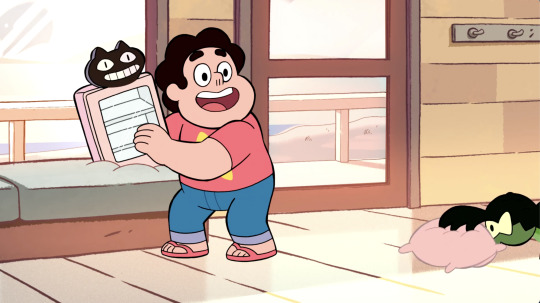
"Awesome! What are these things?"
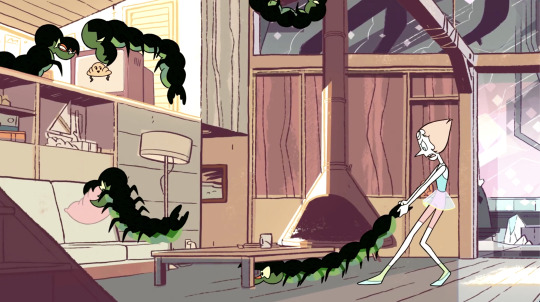
Foundational Trauma #1: Steven's home is always either under threat or actively being wrecked by antagonistic forces/beings, and he constantly copes with this by pushing down his fear in favor of a curiosity and silver linings based mindset.
Look at his initial shock when he opens the door and gets tackled by one of these things, and then his response when one of them spits acid:
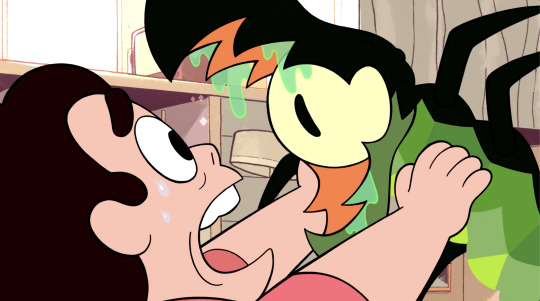
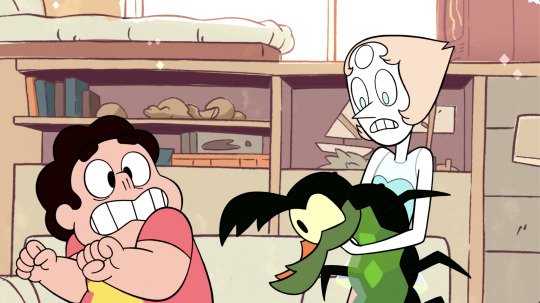
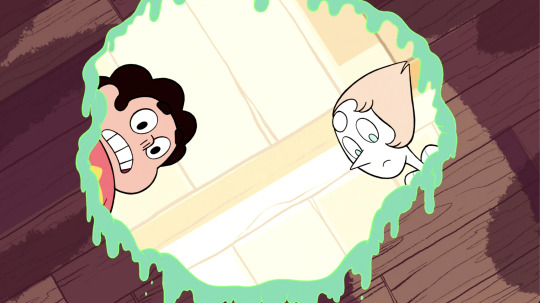
The kid's freaked the hell out about all this, and while I do think there's a part of Steven that genuinely IS curious about what these lil critters are, I think he's subconsciously using that curiosity as a way to distract himself from his own fears and anxieties. This is Steven actively learning how to ignore the deeper problems in favor of emoting a facade to the others in his life that he can totally handle himself in scary situations like these.
The underlying reason why is incredibly apparent, when you look at the example from the next episode-
Laser Light Canon
"I don't know what a magic lady like her ever saw in a plain old dope like me..."
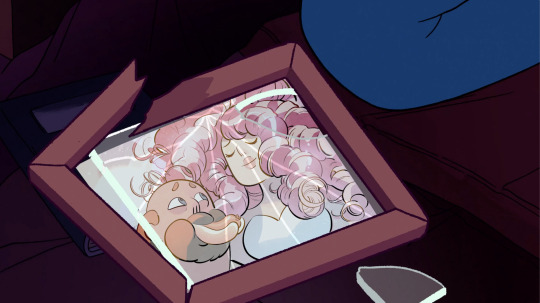
Genuinely- from the bottom of my heart- I think the above quote from Greg is a moment where his own insecurities around the Gems actually rubbed off on Steven.
At this point in time, Steven may be living with the Gems... but he hasn't started to harness any of his powers at all, so in his own head he might as well be the same as his dad- another human, just one who happens to have a gem! But the way Greg talks about himself... given Steven was living with him in the van for years before moving in to the beach house, he had to have heard negative self-talk from his dad like this before.
And then there's the rest of the Crystal Gems... always speaking of Rose with such reverence as if she were an all-powerful goddess... and Steven can't help but look back at himself, and his gem that won't work... the gem that the others still identify as Rose's...
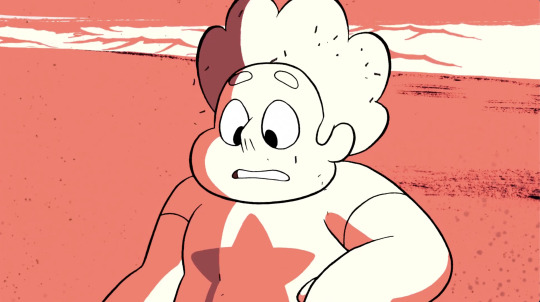
"Your gem-! You have Rose's gem!"
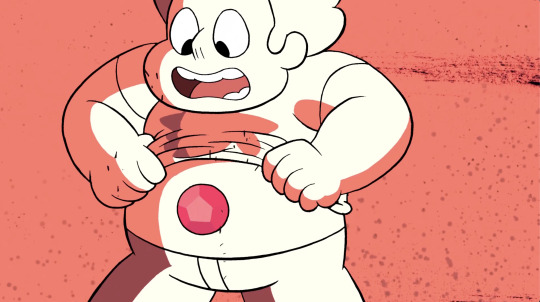
And maybe he starts to wonder if- without any working powers- he's just a plain ol' dope like his Dad, too.
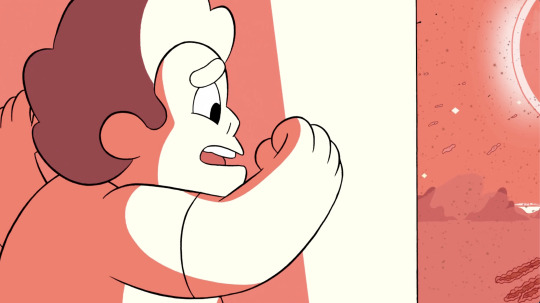
"Please work... Unlock! Activate! Go! Please-!! Everyone's counting on you, you can't just be useless!"
Foundational Trauma #2: Steven has Rose's gem, and as such, is constantly living under the silent expectation to live up to a standard that he simply cannot ever hope to achieve, because he doesn't KNOW her and he never will.
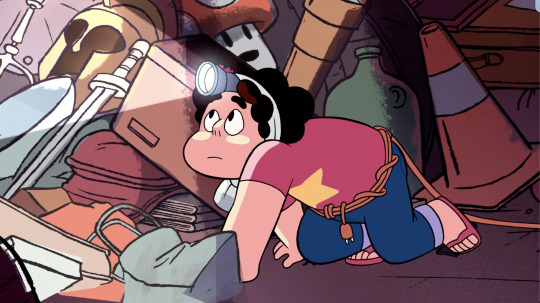
I want to highlight one of Steven's expressions while his dad is talking about Rose- look at that sad look. My god, I just wanna hug him. This is the expression of a child who has already come to terms with the fact that his only relationship with his mom is through the rose tinted stories that other people tell him about her.
Cheeseburger Backpack
So. Steven has learned so far that he needs to push down his feelings and emote a false veneer of cheer and bravery even when he's afraid, because the rest of the people in his life have expectations and hopes for him due to the legacy of his parentage and he can't bear the thought of letting them down. (And in a sad way, at this point "letting them down" literally just means... being an ordinary human boy. I believe Steven at this stage of the show is flat out scared to be human, because to be human is to fail at being a Gem, and no amount of love and sacrifice in the name of humanity in the seasons to come could've ever saved him from the fundamental fact that the wedge between him and this whole half of his being was already drawn long before the events of season 1 even started. But I digress.)
Let's see where we go from there. Let's check out Steven's first "mission." Or as Pearl puts it about 35 episodes later, his first "test."
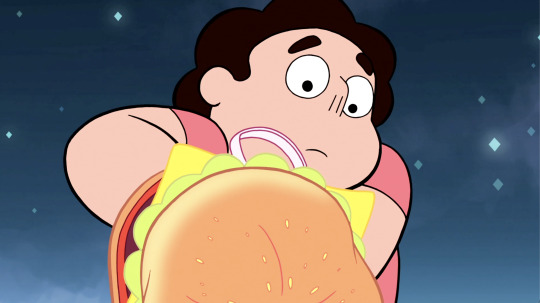
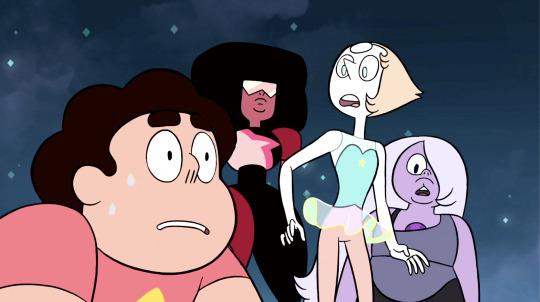
"Yeah... they can't all be winners."
This episode is tinted with a little bit of tragedy for me on rewatch, because I genuinely do think the Gems handled the situation as well as they could've. They were supportive of Steven's successful ploys, and (for the most part) responded with grace when he majorly blundered and left the Goddess Statue at home. The main problem, however, is that Steven has already developed a bit of a complex about impressing the three of them-
Foundational Trauma #3: Even when they claim otherwise, Steven has convinced himself that affection from the Gems is transactional, and that when he messes up he's not truly a part of the Crystal Gems.
Of course we the audience know this isn't true- I mean, hell, Amethyst even said as much in episode one after her slip-up ("and you're fun to have around, even if your gem IS useless!")... that the Crystal Gems wouldn't be the same without him. But Steven... the poor kid is a complicated little guy living a complicated life, and whether they intended it or not, the language used they've used around him thus far has not backed up their attempts at fully embracing him, human parentage and all.
Thus, Steven just spends the entire episode wracked with anxiety trying to find creative non-power using ways to make the mission easier so he can convince them he's useful to have around.
Look how nervous he gets even when all three of them are visibly and vocally supportive of his presence here:
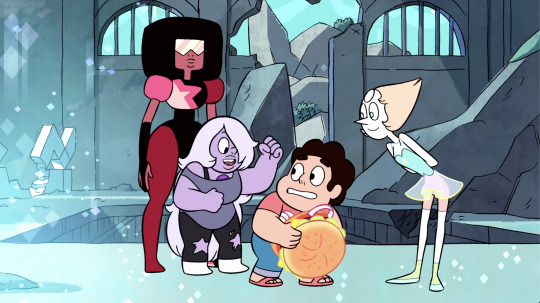
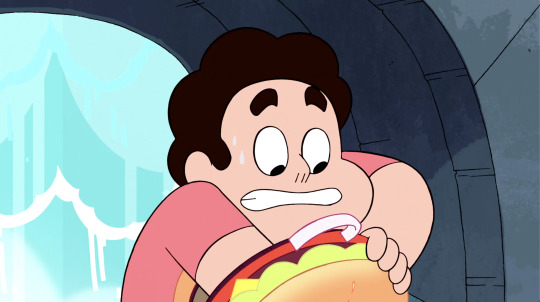
This is the face of a boy who feels like he's under constant judgement and scrutiny from those around him.
Blessedly, viewing this episode in isolation, he experiences a brief moment of mental respite where he finally accepts the Gems' encouragement and agrees that his ideas 'can't all be winners,' but this lesson does not stick for him moving forward. A shame, really.
Together Breakfast
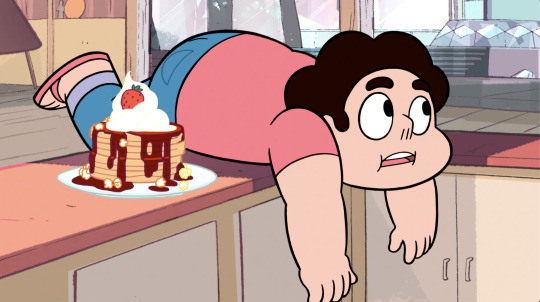
"What's the matter, Steven?" "I wanted us all to have breakfast together, so I made Together Breakfast! But everyone keeps leaving..." "Oh, that's nice..."
Taken in context with what we've learned already in the last three episodes, Steven's desperation to spend quality time with the Gems here and his sadness that they keep leaving him alone doesn't just exist within a vacuum. He spends the whole morning watching them shuffle in and out of the temple, or come back from missions he wasn't invited on, and with the disastrous result of the LAST mission he went on probably fresh in his mind it's not hard to understand why this bothers him.
Foundational Trauma #4: Steven internalizes that the price of "not being useful" is that the Gems actively ignore him, meaning that the only way to guarantee their attention is to work as hard as he can to become a stronger member of the team.
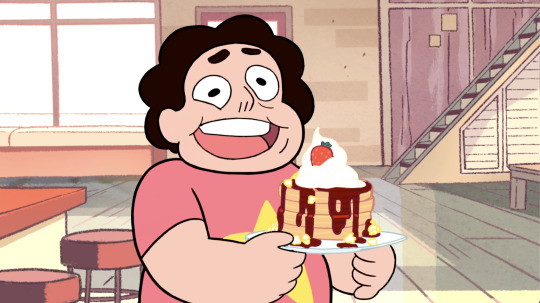
I know this screenshot is usually used as a lighthearted meme, but I wanted to include it because I think it's a good example of how Steven's intense desire to impress permeates every facet of his personality at times. Just LOOK at how desperate he is to make Garnet laugh at his joke, to be the one that's at very least "fun to have around," as Amethyst put it in episode one.
The Gems do eventually drop what they're doing to spend time with Steven by the conclusion of this episode, but this only comes after Steven shows his growing strength and "proves" himself by saving their butts from the breakfast monster.
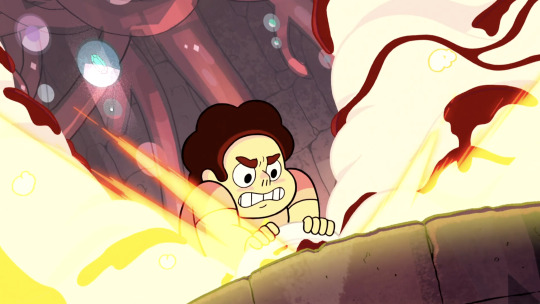
If he successfully gained their attention in literally any other way he might've come away from this episode with a different lesson, but no. Instead, his fears were proven true- the Gems value strength and utility, and if he's not exhibiting that, then what use is he to them?
These fears of his can be seen weaving throughout the foundational fabric of the entire show, but I think Steven lays out what he sees as his "stakes" in the clearest way possible in the episode 'An Indirect Kiss.'
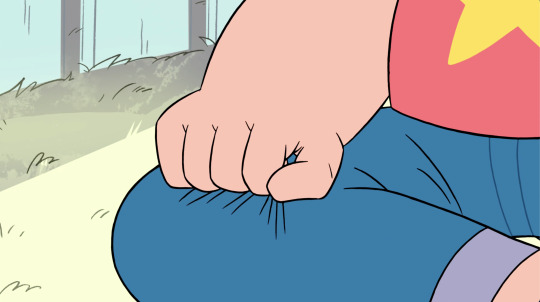
"But- if I don't have powers, then I can't hang out with Amethyst, or Garnet, o-or Pearl, and- I-I can't go on missions!"
And these same insecurities even rear their ugly head as late as the movie.
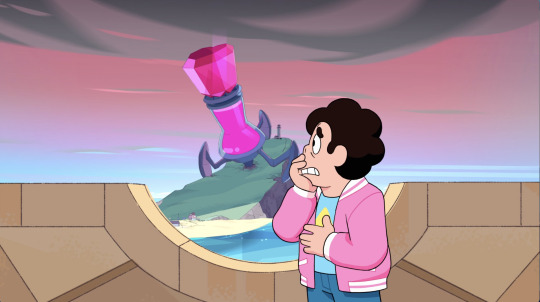
"I can't believe this... for the first time in years, everyone's in danger, everybody needs me, and- I'm useless!"
Powers = Utility = Worth = Other's love, for Steven. Everything is transactional to the end, which is a hilarious double standard he's set for himself when he's made his reputation as the kid who always listens and encourages and gives others a chance to change, no matter their messy history with him.
__
So let's recap and restate those foundational traumas from Steven's perspective.
One: The only way to cope when your life is constantly under threat is to bury the damage and pretend to be fine.
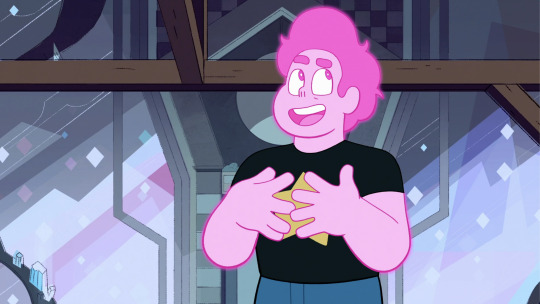
Two: Everyone expects you to live up to the standards of someone you're not.
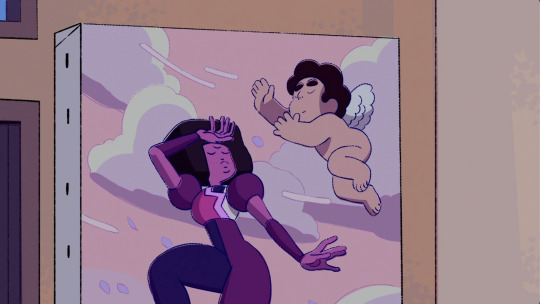
Three: The Gems only love you when you're of use to them.
Four: If you ever stop being useful, the Gems won't want anything more to do with you.
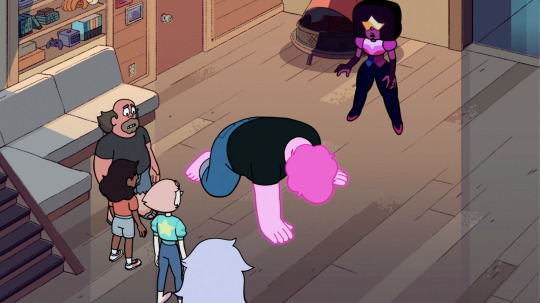
In sum, Steven's habit of burying his feelings for the benefit of others was there from the very beginning, not just since 'The Test.'
Those unreachable standards he felt so daunted and intimidated by all his life were the ones set by Rose, at first... but over the course of the series, the dynamic of this shifted. As Rose's influence fell into the background, Steven's rose into the front. And so it's with great irony that- by the time of Steven Universe: Future, the expectations this exhausted, worn down teenager is fighting to once again achieve are the ones HE set for himself. Many of young Steven's selfless actions during the war are quite admirable when analyzed in isolation, but almost none of them are sustainable. He set himself on fire just to save the world, but teen Steven is genuinely unable to see this for what it is yet- as a tragic sacrifice of his own childhood. You can't burn your own ends for others forever, not at all. His breakdown was simply inevitable.
When it comes to the interconnected beliefs three and four, these are exactly why the ultimate confrontation at the end of I Am My Monster HAD to be one fueled by selfless love. Steven is at his absolute lowest at this point- he's everything he fears he's become, trapped in a form that's nearly incapable of reason. He's big and angry and spiky because that's a part of the facade- because a part of him WANTS to scare the Gems away, wants to be left alone forever, believing this the fate he deserves as price for his misdeeds.
In this form, by his own definitions he is NOT useful to the Crystal Gems at all.
But they don't care.
Because it never WAS about Steven's 'usefulness' to them, they simply love him for being Steven.
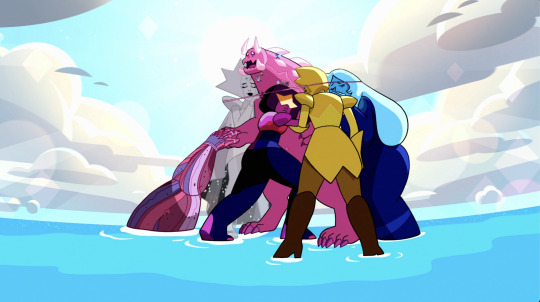
With this in mind, the conclusion of Steven Universe: Future wasn't just a salve to teen Steven's immediate struggles, it was a salve to the foundational insecurities that have been plaguing him his entire life.
And hopefully... from this point on... his family's shows of love and encouragement will be enough to finally convince Steven that he's more than worth their time...
No matter what path the future leads him on, and no matter what form he takes.
1K notes
·
View notes
Text
It's so weird to me when people complain about Astrid becoming more "feminine" as she grows up, as if that takes away her strength and courage, as if she can no longer be tough if she's associated with traditional feminine qualities.
Specially when you consider how the fundamental thing that changes about her is that she becomes happier and more airy, thousands of years worth of pressure being taken out of her shoulders now that she doesn't have to fight in a war that for so long had dictated her life and future. You can already see how that change begins in the first movie after her flight with hiccup, but it's so blatantly clear in rtte; she's more cheerful, she laughs often, you can see how she's way more comfortable with herself.
And the thing is that she's still Astrid! She still has a bit of an anger management issue, she still isn't afraid to call everyone out on their bullshit, she always speaks her mind, and she never becomes a two-dimensional love interest, she's a very complex character with lots of flaws and strengths. And most importantly, she's still a warrior, that's still one of the more defining traits of her character and something she takes pride in exceeding in and that everyone admires and respects her for.
And I just feel like acting like all of that is erased because she also has more of a “girly” personality is rotted in misogyny and believing that girlhood is a synonym of weakness and superficiality.
2K notes
·
View notes
Text
so. many people have already pointed that koana is sort of like an ARR alphinaud remix and while it is not untrue, i think this analysis is only superficially correct. because the salient point of koana's character is that he feels shame and resentment towards his roots & origins and therefore overcompensates with sharlayan weabooism (well-intentioned, but still unsuitable). he comes off as really weird and stuck up, in the beginning especially, where it's like. "what the fuck is this guy's problem" in a way that's rather similar to the average player's reaction to ARR alphinaud.
BUT!
the thing with ARR alphinaud is that he was the Quintessential Sharlayan, both on account of his upbringing and family tree, and of his personal interests and achievements. he was (and still is) secure in his origins and cultural identity. koana's case is different, because he clearly loathes tradition and turali cultural practices in a way that comes across (and fundamentally is) really weird and destructive, which comes to bite him in the ass on many occasions during the rite of succession (and understandably so).
it all starts to make sense when you learn about his backstory though. while we know that wuk lamat doesn't remember anything of her own childhood, having been adopted by gulool ja ja as a toddler, koana was adopted at a much older age. he remembers his early years, and that's what fuels his entire vision for the future of tural. as he tells it, he was born to one of the most traditionalist hhetsarro tribes in tural, and abandoned (accidentally(?) left behind) during one of their yearly migrations, only surviving thanks to a pelupelu merchant who rescued and took him in before employing him in his tuliyollal shop. an obviously incredibly traumatic event that would shape everything about his future mindset: he's closed off and withdrawn to the extreme, highly analytical, values self-sufficiency and independence and technical innovations above all else, because that's how he survived to begin with. because his nomadic, highly traditional, presumably (from what we've seen of the one hhetsarro tribe we've met so far) tight-knit, spiritual and social tribe rejected and abandoned him. it would make sense that he'd rationalize this unfathomable violence by leaning hard into the opposite, and letting his own pain and resentment color his entire vision, turning his own feelings into a more general mindset of shame, resentful inadequacy, and complete rejection of anything "traditional"
i think sharlayan was a good choice for him because it's pretty much, indeed, the opposite atmosphere: in sharlayan culture, family ties are a lot less emphasized, while the kind of ties that colleagues, peers, teachers and students develop are considered as very important (see pretty much every sidequest and margrat's custom deliveries and all). all these relationships based on a common work and aspirations rather than origins would indeed agree with koana's character better, and his analytical skills, vision and intelligence are pretty much the most valued traits to them.
which is why it was actually such a stroke of genius to have thancred and urianger specifically support him. of course, both of them had a character development arc that echoed with koana's issues: learning how to express himself more openly and acknowledge his feelings, all that, meaning they were uniquely able to help him. but when you look more closely, they can also relate to him on a more personal level: thancred was "adopted" by louisoix as an orphaned lominsan street urchin, probably at a similar age as koana when he was adopted by gulool ja ja; and urianger's parents notably "abandoned" him to the point he was mostly tagging along at moenbryda's house and, later, at the leveilleur estate, as louisoix's disciple and honorary uncle to the twins (also worth noting that urianger and koana share the same flavor of autism).
so the rite of succession was a much-needed window into his own biases and (literal) coping mechanisms, and must have been quite difficult to deal with considering pretty much all the feats involved interacting with and strengthening tight-knit smaller communities with strong traditions and family ties. luckily, partly thanks to thancred and urianger (but not only! he did the work himself), he was clear-minded enough to realize his own failings, and well-intentioned enough to step down - because he did not want power for its own sake, unlike zoraal ja; he wanted to protect the turali people from a potential invasion by leaning hard into foreign technological advances, therefore mimicking his own personal journey and adapting his own tried-and-true methods of survival: anticipating the hardships, being as independent and self-sufficient as possible, and choosing isolationism.
and finally i want to point out that the new techniques and technologies he imported from sharlayan are all (safe, fast and reliable) modes of transportation: aetherytes, dirigibles (including the alpaca carriage adaptation), and trains. interesting choice, moreso considering that while aetherytes are the #1 sharlayan specialty, they have neither dirigibles nor trains; which takes on a whole new layer of meaning when you remember that his original tribe was nomadic and that he specifically was left behind, stranded in the desert, during one of their traditional migrations............
in this regard he truly IS green g'raha, considering that g'raha was, similarly, raised in a traditional seeker manner before being sent to sharlayan for his own (and the tribe's) safety; of course the difference is that g'raha embraced his heritage by locking himself in the crystal tower by the end of ARR, since the G tribe was tasked with guarding the remaining allagan ruins and weapons, to make sure their power would not be misused by yet another imperialist military force (he locked himself in the tower to reinforce its defenses and make sure the garlean empire would not access it to conquer eorzea)
thank you for your time 👍
#dawntrail spoilers#dawntrail#7.0 spoilers#koana#listen i know i'm forgetting a bunch of things#but this is a beginning#i also think (and hope?) that he'll get more character development#what a great and compelling character i did not anticipate that i'd love him so much#on a more personal basis this is killing me because this is pretty much irma's entire character and backstory.#top ten traumatized children who developed hardcore cringe sharlayan weaboo tendencies To Cope
404 notes
·
View notes
Text
Had a good chat with my partner about it today that maybe let me put a finger on what's always bugged me about "we're here to fix canon" attitudes being so prevalent in fandom (especially in the past 10ish years) throughout my life. This is not to say there's never a time or place for that (I've written fix its myself, or the occasional meta on how something could be fixed/improved) or that people are wrong to (we're anti fandom policing). It's also not an issue to me on the basis of "I love my blorbo in canon and fandom mischaracterizes them in the name of 'fixing' them" etc as it is just... coming from a fundamentally different perspective for story analysis / interaction than most (not all) people in fandom, I think.
One of the reasons I enjoyed getting my English degree was because I was finally being encouraged to and taught in alignment with what my brain had always be inclined to do: you always assume that there's a reason, and a good reason, for the story to do whatever it's doing. It assumes that the story is already exactly what it is supposed to be as it is supposed to be, and it's up to you to find the reasons Why.
The story was boring, or made you feel uncomfortable/bad, or you couldn't root for a character or relationship? All of that, at least at the beginning, doesn't really Matter. You assume that the story is paced fine, you assume the discomfort was intentional or part of something broader (historical shit that hasn't aged well) or that the dichotomy of "I feel invested or not invested" isn't useful. And in doing so, you replace all that with asking why.
An example I'll use is 1984 by George Orwell. I read that book in high school and I fucking hated it. Normally, I like the protagonist the most in anything I watch/read, but in that book, I loathed both the two leads and were actively rooting for them to be captured and tortured so the book could end faster; it was an actively miserable affair. I don't think that was necessarily the author's intention (certain amount of death of the author is baked in, but for a lot of the texts I was reading, we didn't even know the author or anything substantial about them, i.e. Beowulf) but, more importantly, I don't think any of those things are Flaws or downsides in the text.
Part of this is because 1984 is a dystopian novel (if a romcom book breaks genre convention that badly where you're miserable reading it, yeah, maybe something went wrong, but more on that in a minute) but even then it doesn't really matter on the basis of genre; I'm sure some people read 1984 and felt fascinated/excited while reading.
Rather, the focus becomes: what do I find so unlikeable about the protagonists? Why would they be written that way (on purpose)? What does it say about the society they live in? What does it say about their characterization, social stratification, etc etc? If a character does something that I think is non-sensical, why? Have I missed something? Should I watch retrospectively for clues? Is there another way to engage and to understand? Is what I label as confusion potentially a, or the, Point?
It is only after finding the reasons, and/or finding them unsuitable, that I let my subjective feelings into play. While a story can have great merit on the basis of relatability, relatability or "this aligns with my worldview / expectations / desires / etc." is not the be-all end-all of discerning quality
For example, I'm never going to be a fan of Jane and Rochester (she's 18, he's her 40 year old employer who routinely lies to her) but there are reasons, Good reasons, they get together in Jane Eyre (a book so subjectively boring I struggled through it twice) in response to both when the book was written and with the book's themes / symbols / their characterization. If they didn't end up together, it would be a fundamentally different story; it would not be Jane Eyre. So objectively, it's fine and an understandably massive influence on the western literary canon; subjectively, it's so fucking bad and I'm so glad I never have to read it again. But if I stopped there with my lack of interest or dislike of the main romance, I'd be missing out on what the text has to offer as well, the text.
This applies to more modern day stuff as well. I don't like Double Trouble from SheRa as nonbinary representation, and I'm nonbinary myself; however, I can acknowledge that the things I don't like about them were probably simultaneously empowering and exactly what the author (who is also nonbinary) wanted to be per his own experience of gender. Having a "I assume the text is right" mindset means that I can hold space for my own feelings/analysis (i.e. I also did not like Catra's arc, as I think she needed to learn other things / be written under a different lens) while holding space for the text as is (under the canonical lens of Catra learning it's never too late to be saved, I think her arc is conclusive and well done). And these two viewpoints aren't fundamentally opposed, but can coexist as analytical soup, being equally true / having equal value under the subjective (my view) and more 'objective' (the canon text's construction, or what I / the scholarly consensus, if it exists, believes it to be, anyway) at the same time.
Again, none of this is to say that you can't take issue with a canon text, or want to change something. I remember one time I was watching a show where their refusal to explore a romantic relationship between the female lead and her guy best friend was actively making the show worse; I understood their reasonings of wanting to put them with other people to explore their relationships, and wanting to emphasize a male-female friendship at the core of the story, and I still wanted them to put the two together as a Ship instead for various reasons. But that doesn't mean my line of thinking would've been Objectively Better—assuming if they had been paired together would've been executed in the manner I'd enjoy, or that them being paired with other people couldn't have been executed in ways I would've enjoyed more—merely that I likely would've enjoyed the series more per my own subjective preferences.
What I see in fandom sometimes is that people, understandably, aren't approaching at the start from a "the story always has a good reason" as much as they are speed-running from a "this didn't make sense to me or felt bad/off" and maybe examining why (which is supremely useful!) but not going back to examine the other side of the coin as to why the story would do it anyway.
Because sometimes the story—or a part of a story—is still 'bad' to us. It's just worthwhile to look at why it's 'good,' too.
#dragons rambles#mine#writing#literature#analysis series#analysis#this is also the singular reason (beyond being able to explain thoughts) why i'm 'good' at analysis tbh#you just ask why. you assume there's a why. you assume there's a good why#only when the story stops giving compelling whys that don't fit into anything else going on does it start Declining tbh#atla fandom im looking at u#'i don't understand why kataang ended up together / the lion turtle energy bending' have u honest to god tried to#this is also reflected in how i write bc whenever my story changes it's underpinned with a feeling of#'this is always the way the story was i just didn't know it till now'#also contributes to taking 90% of things ppl say in good faith tbh
213 notes
·
View notes
Text
'Common' Theriotypes. Why They Exist and What The Cause Might Be.
Aka. Uh oh guys, Tiercel’s been thinking a little too much about nonhumanity.
If you've been active in the therian community for any amount of time, you may have noticed the prevalence of a few animals absolutely dominating discussion boards, video posts, and therian-centric sites. I am, of course, referencing the high number of wolves, domestic or large cats, and foxes. You may have also noticed that folks in (or outside) of the therian and broader alterhuman community claiming that a majority of people with these theriotypes 'must be faking' due to their (apparent) majority. I won't deny that certain theriotypes seem more 'popular' than others, but I don't personally believe that their prevalence actually has anything to do with 'faking therianthropy'. I'll be breaking down why this might be into multiple sections to better organize my thoughts on the subject matter. Easy Visibility When a therian first awakens, discovers what the therian community is, or begins to question their therianthropy, they often reach out for help or search for resources to assist them in figuring out what their theriotype may be. Frequently they're told by other therians or the sites they look to to research animals that align with their instincts, shifts (if they experience them), and the environments they remember (if they believe the origin of their therianthropy to be a past life) and/or feel most comfortable in.
The primary issue with this advice is that animal behavior, while specific to each animal, can be generalized across clades and even across unrelated species. If the questioning therian searches for their theriotype based on their food-guarding tendencies, growling, and love of cold climates, they're equally likely to be a wolf, a marten, a wolverine, a fox, a bear, a lynx, or any other predatory cold-biome mammal. Which one of these animals do you think is going to pop up first when they're researching cold-climate predators that match their specifications.
A Wolf. And because questioning therians are not frequently encouraged to search further than the first result, or are not sure how to fully determine if the animal is their theriotype, or is just one they feel a strong connection to, they go with the first animal that popped up. This is the primary reason why 'popular' theriotypes happen. They're the first animal(s) in the search bar when questioning therians go looking, and they're often not informed enough about the process of discovering one's theriotype to look for other options. They may also feel pressured to have figured out their theriotype already, given that every other therian around them already seems to know. Solving this issue is as simple as encouraging further search and not jumping headfirst into declaring an animal your theriotype. Reassure questioning therians that it's OK to not know their theriotype immediately, and it's OK to keep looking. It's also OK to find out you were wrong later on and 'change' (not actually change, but rather adjust the label of) your theriotype to your more accurate one.
Not A Theriotype Perhaps controversially, the 'popular' theriotypes may not be theriotypes at all. When questioning therians are introduced to the community they're often unfamiliar with terms such as otherhearted, otherlink, copinglink, or archetrope. Because they're unfamiliar with these other words and definitions, they assume any sort of connection with an animal (extant, extinct, or mythical) is therianthropy. The reason that 'popular theriotypes. may show up more often as hearttypes, links, or tropes (though this one is fairly nebulous) is because they're often easier on a fundamental level to relate to or project feeling, emotion, or connection onto. They're easier to identify with from a human perspective due to the human nature of anthropomorphizing nonhuman animals and due to humanity's familiarity and fondness towards them, and so they appear more often as hearttypes/links. In the case of links especially, because it is a voluntary identity, more 'popular' animals are chosen specifically because there is an aspect of choice involved. 'Popular' animals do have a 'cool factor' to them that makes them more beloved by linkers and more likely to become links. And this isn't a bad thing in the slightest! This particular issue can simply be resolved by further educating the alterhuman community on the terms used within it. I personally recommend the Alterhuman Dictionary as it has easy to understand and up-to-date definitions. Not A Therian We must be able to calmly confront the fact that, at the end of the day, some of these therians with popular theriotypes may not be therians, otherhearted, otherlinkers, or copinglinkers at all. However, that does not mean that they are faking, and it's harmful to assume so or claim that someone is. Firstly, many of the therians with 'popular theriotypes' that other therians complain about are very young. 12-16 most of the time. Secondly, this age is when a lot of things about one's personal identity are in flux, and it's prime time to begin discovering who you are. Exploring one's identity is fundamentally nonharmful, and this can mean testing out labels and identifying as something you may turn out to not be at all. There's no shame in this. I myself thought I was some form of canine for many years before realizing that my ‘canine’ behaviors were not canine at all, they were draconic. And ultimately, age does not factor into this as much as you’d think it does. Yes young therians are likely to be a little more tactless than adult therians on the internet, and are more prone to bullying, but anyone of any age is capable of exploring their identity and getting it wrong the first few (or few-hundred) times.
Therians in New Spaces The real catalyst for the vast majority of this [extremely pointless] discourse is the fact that therians are in the public eye now more than ever. Videos of therians go viral on TikTok, the news (inaccurately and harmfully) reports on us occasionally, and bigots who scream about ‘identity politics’ and ‘blue hair and pronouns’ have latched onto us as a new target to bully and harass. This is nothing new, the community has weathered harassment before, but the widespread nature of it is what’s inflaming this discourse. People make fun of ‘popular’ theriotypes because they want to distance themselves from ‘cringe therians’ (usually just vocal and proud younger therians), they want to avoid the bullying that easily targeted therians are facing so they join in, or because they feel like gatekeeping the community from supposed ‘fake’ therians is the only way to keep ‘true’ therians safe. The best way to mitigate this is to correct misinformation, educate, and if worse comes to worse, block. The block button is your best friend on the internet (where most of this discourse and bullying occurs), if someone is harassing you and won’t let up, or even if they just severely irritate you, blocking them does no harm and is ultimately better for your mental health and (sometimes) safety. Conclusion While perhaps more scrambled, I hope this essay has helped you understand the inane discourse around ‘popular’ theriotypes and what to do about it (if anything). I’ll leave you on the reminder that you’re under zero obligation to educate those who won’t listen, your experience with alterhumanity is going to be different from everyone else’s even if there are similarities, and you do not have the knowledge or right to tell anyone you do or do not know that they’re faking an aspect of their identity. Leave people with ‘popular’ theriotypes alone. And by the fucking gods, please stop arguing about it. It does not matter.
#tiercel talks#alterhuman#otherkin#therian#discourse#i'm so fucking serious y'all please stfu about 'popular theriotypes' i'm tired of hearing about it
86 notes
·
View notes
Text
Mind Flayers and prions: a scientific analysis
Earlier today, I did some brain-related research for a fic of mine, and had a horrifying realization: what the hell happens if a Mind Flayer, which exclusively eat brains, catches a prion infection? A normal Mind Flayer is terrifying enough, now imagine one with kuru!
Then it was suggested to me that Mind Flayers would likely be immune somehow. And yeah, that seems like the second-most Occam's Razor-compliant theory (the first being that prions don't exist in Faerun, but come on, I'm a fucking biology nerd with a Masters in epidemiology and a love of parasitology, the odds of me making it that easy were fucking zero). But the question is: how would that work biologically?
So then I started with a deep-dive into prions in our world, and got my answer from a study on transgenic mice.
Before I get into that, though, I want to lay out the assumptions I'm making here:
Prions exist in Faerun, are capable of infecting humanoids, are found at the same locus (the Prnp gene that codes for PRion Protein [PRP] is located on the short arm of chromosome 20), and are transmitted the same way (in this case, the most relevant is consumption of infected brain tissue).
Considering that in Forgotten Realms canon, Mind Flayer tadpoles can't be inserted into dwarves, gnomes, etc (BG3 diverged from canon in this, and I can't blame them, it would be a sad and lonely game without little folks around), Mind Flayer DNA most closely resembles humans, but is obviously different from human DNA in more areas than elves or orcs (who we will assume are much more closely related to humans given that they can reproduce together) are to humans. That is to say, elves and orcs are closer to humans on the phylogenetic tree than mind flayers are, but mind flayers are still close to all of these, most especially humans.
The genetics of all organisms in Faerun are fundamentally the same as ours. The proteins and respective codons are the same, their form and function and significance are the same, they use the same five mammalian nucleotide bases... you get the picture. Minor genotypic differences are definitely there, but we're going to assume the foundations that inform our understanding of genetics as a whole are the same.
So, then. First, a very brief introduction to prions, because many people have never heard of them aside from possibly knowing about "mad cow disease" (feel free to skip this if you do already know):
The word prion is derived from the words protein and infection. It's exactly what it sounds like. It's a protein that is also an infectious agent, not a virus of bacteria. It exists as a wrongly-folded protein, and is very resistant to protease (enzymes that normally would break down a problematic protein). Over time, due to their resistance to proteolysis (the process that breaks down proteins)*, they eventually can force other proteins to misfold.
*Seriously, it can't be understated how terrifyingly resistant these things are. They can be inactivated with bleach, yes, but they resist autoclaves. You have to subject them to heats of 900 degrees Fahrenheit to denature them. For reference, the inside of a volcano is usually about 2,200 degrees.
The shape of proteins is extremely important in how they function, and proteins really want to be as parsimonious as possible; they want to use the lowest amount of energy possible to find a stable shape. The misfolded proteins require a lower energy expenditure than the normal form to maintain their shape, which is also more stable (hence its resistance to denaturing by heat), so normal proteins adopt it quite readily once exposed. From there, gradually (as little as months to as much as years) the proteins all convert to this unusual state. Unfortunately, while it's more stable for the individual proteins involved, it's a lot less stable for the brain itself, and the cells there begin to clump in amyloids, which cause brain damage and ultimately death. Prions are 100% fatal and care is limited to comfort measures. They also cause probably the worst symptoms of any disease I can think of. For example, the worst one of all, Fatal Familial Insomnia, literally causes sufferers to become unable to sleep. They start with extreme trouble sleeping, then over the course of a year find themselves gradually able to do it less, until one day they can't at all. Death follows in a few months, by which point it's downright merciful because they've been plagued with pain, paranoia, loss of memory, disorientation, headaches, weight loss, and more.
Prions are transmitted in a few ways: as noted, eating infected animal tissue is a big one, and was what led to the "mad cow disease" outbreak in the UK in the 1990s; cows were fed food containing the brain matter of other diseased cows, picked up the disease, and were then turned into food which infected quite a few people. Other ways are through contaminated medical equipment (as noted, you need to basically nuke medical equipment from orbit when it's used on someone with prions, and the long time from exposure to disease onset means a lot of patients are sick unknown to themselves or doctors), through genetics (IE Fatal Familial Insomnia), or sometimes even through spontaneous development if you're one of the unluckiest people on Earth.
So that's your primer on prions. Genetics, I'm going to assume some knowledge here, but I will give a brief explanation (brief because I don't want to seem like I'm just giving a thinly-veiled biology lecture).
The way genes code for proteins is by a series of codons, which are sequences of three nucleotide bases (A, C, G, and U/T depending on whether it's DNA or RNA) that are read and translated by the body. Most of the DNA in your body is non-coding and doesn't do anything, but the regions between a start and stop codon are what are used to make the proteins you need.
The gene that is implicated in prion diseases is known as Prnp, and produces the prion protein (which in its normal state is called PRPc and in its diseased state is known as PRPsc [sc standing for scrapie, which was the first prion disease to be discovered]). It is located on the short arm of chromosome 20. What it does normally is a bit of a mystery still, but the most widely believed hypotheses are cell adhesion or neuronal communication.
So, most mammals are really susceptible to them. Deer in the USA are currently suffering from a massive outbreak of one called Chronic Wasting Disease, humans have quite a few that affect us, and there are some notable ones in sheep, cows, etc. Even cats can get it. Rabbits are believed to be immune, but when scientists did an experiment with transgenic mice that forced them to express the lapine version of the Prnp gene, scientists could still force the protein to misfold by infecting the mice with prions, which suggests their immunity isn't absolute.
On the other hand, canines are also resistant, and scientists who tried to infect transgenic mice in the same manner after making them express the canine version of the gene had no luck (study can be found here). In wild type mice, the attack rate by the prions was 100%, but in the ones with the canine PRP, the attack rate was 0%.
We're getting a bit closer to our answer, then: clearly dogs have a gene that confers protection to their PRP, and since mind flayers most closely resemble a mammal (despite not reproducing the way humanoids do), the answer to mind flayer immunity would likely lie in the same gene.
As for the gene itself? Turns out, dogs have a codon at this locus that is found in very few other mammals. They contain codons that make, depending on the particular base pairs involved, either ASP (aspartic acid) or GLU (glutamic acid). This is not only rare (to the point of occurring in only a few other mammals), but provides a useful comparison: the PRP cats express is the most similar to a dog's. The feline Prnp gene doesn't include codons to make GLU or ASP. Cats are highly susceptible to prions.
So, while the why is still unknown and the correlation not proven yet as a causal pathway, it seems there is very likely a significant link between GLU/ASP production on that locus and the protection conferred to dogs against prions.
SO, finally, we can answer the question. Could mind flayers be safe while eating a diet of exclusively brains, even if they ate the brain of a creature infected with a prion? Yes, they could, assuming their Prnp gene has codons to produce ASP/GLU proteins as part of their PRP. And really, when you think about it, this would be yet another way illithids would claim to be superior organisms; while humanoids have to worry about an incurable neurodegenerative disease caused by something as trivial as an error in protein folding, illithids are conferred immunity by the ceremorphosis process. So it makes sense for the psychology of mind flayers that they're immune, too. And hell, they might even seek out humans infected with one, given they'd be weaker prey, the same way wolves just love to eat moose infected with a fatal brain parasite- and in turn, just like that protects the rest of the moose herd from being infected, illithids consuming sick humanoids would protect other mammals in the area too. It's certainly the kind of thing goodest squid Omeluum would do.
Thank you for coming to my TED Talk.
112 notes
·
View notes
Text


What's this?! Spade of Storms is canon in the game now?! /j
Finally finished this Spade of Storms WIP from early June 😅 Click for better quality!
Reblogs are very appreciated ~
「 Bonus versions & ship ramble below the cut! 」


♤ More Deuce x Allen: ♤
SHIP INTRO: 1 // 2 // 3 // 4
OTHER ART: 1
Ship blog: @spade-of-storms
♤♠︎♤♠︎♤♠︎♤♠︎♤♠︎♤♠︎♤♠︎♤♠︎♤♠︎♤♠︎♤♠︎♤♠︎♤♠︎♤
♤ Ship ramble ♤
There are many reasons why Allen and Deuce are perfect for each other (list), but a fair share of said reasons are rooted in or can be traced back to one massive, highly important core point: these two have extremely similar experiences in a reversed order.
Said experiences shaped their personalities, goals, insecurities and "masks" — all of which are highly important factors for Deuce and Allen's relationship development.
So today, I'll be talking about how their backstories influence Allen and Deuce's relationship.
Something I noticed is that if Spade of Storms weren't dating, they'd pretty much end up experiencing at least parts of each other's backstory... and end up in a super miserable state.
Allen is a former honor student who overworked himself to the point of burning out, all because he was a people pleaser and his stellar grades still weren't enough for his teachers who expected nothing but the absolute best from him. Additionally, he had to suppress his true self and interests because he was expected to be a model student in every single way, and anger was something only "bad" kids felt.
Sounds familiar? Deuce is unknowingly on the path to end up in the same situation, except in his case, the fact that he can't seem to achieve better grades no matter what causes him even more distress. If he actually ended up becoming a honor student, Deuce would experience a ton of additional pressure, not to mention that he's already struggling to hide the delinquent tendencies that are a fundamental part of his true personality... Sure, "honor student" sounds like a nice and admirable title to have — but the reality behind it is cruel, and Deuce isn't aware of that yet.
Which is why I gave him Allen.
A large part of Allen's trauma is rooted in his past as a honor student and the crushing expectations people (including himself) threw at him, and he desperately wants Deuce to watch out for himself and approach his goal of becoming a honor student carefully and logically rather than bite off more than he can chew and end up drowning in even more pressure, self-suppression and insecurities. Allen doesn't want Deuce to experience all the negative sides of being a honor student and instead supports the Heartslabyul student's goals by working towards them with a pace appropriate for Deuce, helping him study through actually unique methods specifically tailored for Deuce, and — most importantly — giving Deuce a safe and healthy environment where he can be his 100% authentic self and learn how to properly get his impulsiveness under control at the same time.
And the other way around? How does Deuce's past help Allen?
Deuce quit being a delinquent because it not only disappointed his mom, but also caused him a lot of trouble and massively stained his reputation. While Allen can handle his own delinquent tendencies just fine on the outside, his anger is actually much worse than Deuce's, not to mention that he has incredibly violent fantasies about the people he can't stand...
So far, Allen hasn't done anything bad. But Deuce, despite being a delinquent at heart himself, is able to calmly remind Allen to not do anything he might end up regretting or that might stain his reputation, especially since this is a major fear of Allen's. Deuce's worries and loving way manage to keep Allen in check, no matter how strong the Ramshackle student's hatred for society grows.
♠︎♤♠︎♤♠︎♤♠︎♤♠︎♤♠︎♤♠︎♤♠︎♤♠︎♤♠︎♤♠︎♤♠︎♤♠︎♤♠︎
Now, HOW exactly are they able to help each other grow? WHY did they form intimate levels of trust to begin with? And especially, why can Allen actually efficiently help Deuce in the first place when nobody else can?
All will be revealed in the next issue Spade of Storms explanation post >:)
#twisted wonderland#twst#twst art#twst fanart#twisted wonderland fanart#disney twst#deuce spade#deuce fanart#twisted wonderland deuce#twst deuce#twst oc#deuce x allen#deuce x yuu#deuce x oc#twst mc#twst yuu#twisted oc#twisted wonderland oc#spade of storms#allen alagona#yuu twst#twisted wonderland yuu#yuu twisted wonderland#deuce twisted wonderland#deuce twst#oc x canon#artist on tumblr#my art#twst yume#twst prefect
290 notes
·
View notes
Text
This is less about Lin Ling and Nice as much as To be Hero X's speculations with Lin Ling and Nice as excuses/examples
I was listening to New type of Hero on loop and I just thought, like really thought: what really differentiate X from the other heroes. It seemed dumb because of course he was the top 1, of course he was the most powerful, of course he was the most mysterious then I sorta paused. And thought about it again, from my understanding so far that is from watching the episodes and seeing the Trust Value system's insides, these facts are all very much linked. X is the top 1 because he is so powerful, the reason why he's so powerful is because people thinks earnestly that he can do anything since he could be anyone and anyone could be him.
How does this link to Lin Ling and Nice? We're getting to it. So then I thought about, what the show To be Hero X is about. Why does it have so many protagonists which include X mind you but he's the one we see the least of. Then I thought back on what differentiate Hero X, It's that no one know who he is or really what makes X, X. Globally I think that's what the show is overall going to be about: not necessarily just the top 10 Hero, but the who, why and what. We already know how, it's the trust system.
Which brings us to our darling protag, Lin Ling. Why we've been following him from the beginning. I mean no offense to anyone especially since I was a Nice fan since the promo which turned out to not be him and that is so relevant. In the question, who created Nice, he has always, always been the answer. As in Og Nice (whose name we don't know btw) acted out Nice, sure but Lin Ling made the Hero Nice. Ad by ad, line by line, he crafted the persona that is the Nice we see in the top 10 promo in the PV.
He made Nice the product, Nice the brand, and on the exact same day he gets fired, the person incarnating his product decide to opt out of living. Nice doubly dies that day, but gets reborn in a way, in the who he was uncaranter concretely but also who made him.
Which brings us to what is Nice? What makes Nice, Nice? And why? We don't know any of that with the OG Nice that's for sure because it's rather fundamentally not about him, and there's more rant incoming about him since I know nothing yet i'm still a fan, really he somehow incarnated a whole other way of haunting the narrative, missing from it, the silence and dismissal of him is a statement but I digress.
On the subject of what is Nice and why, a first answer has already been given to us since episode 1, Nice is the company's most successful brand, he exists to please his fans since that's what a good product does. But Nice the product is already dead, literally. He died in the first minutes of episode 1.
I think that's where Lin Ling in particular is advancing, if the arc remains about Nice the now top 10 hero as a protagonist, if Nice is now Lin Ling rather than Lin Ling becoming Nice then we're going towards him deciding what Nice is, as in what it means to be Nice, and why. Why is Nice, Nice, and not something else. And yeah, an undeniable part of that starts by him embracing himself, and not just wrapping himself in the idealised Nice he helped create.
This has gotten long but TLDR: I think Hero X is essentially going to be all in not on heroism as a theme solely but also more largely on the duality in each individual hero, Lin Ling has always made Nice but now he's him and he gets to decide what it means. Lin Ling doesn't want to be Nice, the product that much is sure, what he wants to be is a real hero. So either he detach himself from being Nice which would be less messy but I also find least likely, or he changes what it means to be Nice. Something that better fits the idea of Nice preached in his theme song: Paragon in comparison to what Nice is described as in the show so far.
56 notes
·
View notes
Text
No because can we talk about team Sabbath? Not to say that they're hot and they're cool but like analyse them?
Can we talk about how they're different from others individually? How they're socially rejected as if they're fundamentally different from normals?
Firstly, Vinny Hong.
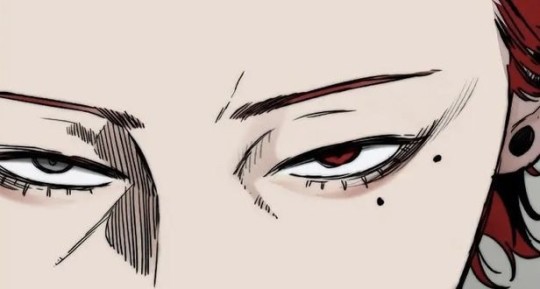
He was always discriminated for being different in every way one can be different from someone. His looks- red hair and Heterochromia which is said to be his albinism. He has been bullied for looking differently than what's beauty standard in Korea, for being different from normal people as he was convinced that he's abnormal one. He was also bullied a lot for being a poor, which sets his difference between rich or non poor people and him. He has been picked on a lot because of that and the fact that he was struggling with money affected his character a lot. We saw that society doesn't treat ppl with albinism and/or Heterochromia well, and plus poor people are often victims of bullying. On top of that, he got in troubles a lot and made himself a name "a thug" in school, which again set him apart from rest of students. He's called mad dog. Teachers can't deal with him, adults are having problems with him and etc. He's completely rejected by society. That's why he wants recognition so badly, so that he can deal with his inferiority complex.
Secondly, Hajun a.k.a Joker
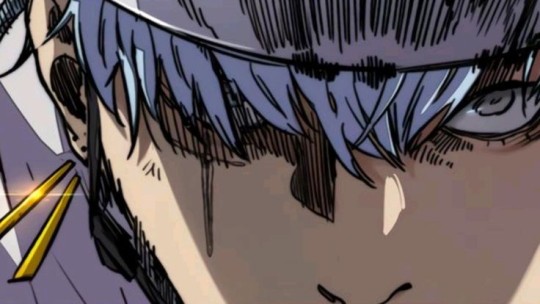
Hajun is underground fighter, I think that already sets him apart from most people and most boxers (as they don't fight for underground fights) so that's one difference for you. Even his little brother hates that he's underground fighter, despite the fact that Hajun genuinely seems to like fighting just as cycling but despite that, his love for fighting isn't being accepted by his own family. He's also different from others as a character. For example, his attention span seems to be short and messy as he gets easily distracted. He's in middle of important race but he gets distracted and stops at red light when he actually doesn't have to. No one stopped in entire windbreaker at red light except Hajun. He also stopped to save the puppy during the race and came in last because of that. People were confused because what Hajun was doing was not making sense for them, that it was actually very different from what kind of players they're used to. Plus Hajun, just like Vinny, is facing money problems.
Thirdly, Wooin Yoo
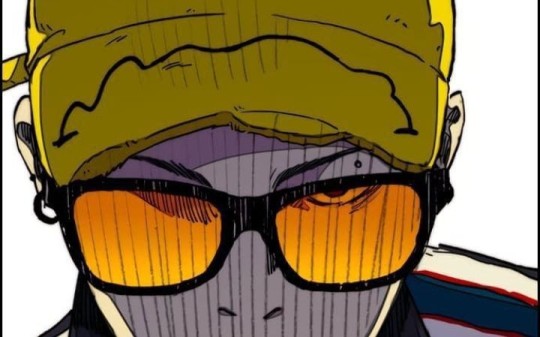
Wooin was rejected by his own family but I think it's also said how people, even now, refuse to admit that he's normal. But first of all, his main issue is his family. Wooin has been trying for years to get recognition from his family, some love and acknowledgement but he never got one, in fact he got redeemed as useless, disappointment, troublemaker punk. All he honestly wanted was recognition from his family, no one else. He was locked up, yes fucking locked up, by his own father and the freedom got ripped away from his hands. I doubt he had much freedom from the beginning anyway. He got locked up for assumingly long time and even if his house was big and even if he was rich, he was extremely lonely. Now, he's seen as weird by people but I honestly think it's because he couldn't develop well due to his abusive family.
Lastly, Hyuk Kwon

We all know why Hyuk is being rejected: his style. He's pro Cyclist, he's really good and talented but unfortunately, he can be aggressive. Like his jack-knife, or how he tried to crush team ghost's member's head with his bike while telling them to die. That's what got him expelled from his previous team.
"i heard Hyuk is kicked out."
"Finally. Everyone who races against him ends up injured haha."
So it's obvious he was rejectec by his own team. If it hasn't been Wooin, he'd probably be dealing with this problem again.
Team Sabbath is being rejected by rest of the teams as well, as other crews don't welcome their style of cycling. But it's like Hummingbird and Sabbath aren't that different, they're both similar to found family but they have different morals.
#windbreaker manhwa#wind breaker#wooin windbreaker#joker windbreaker#vinny hong#hyuk kwon#sabbath crew#windbreaker webtoon analysis
145 notes
·
View notes
Note
Do you think if jc had an adult like wwx around him while being a teenager he would've turned out different? I absolutely LOVE your takes, so I am very curious as to what your thoughts on this topic are
i mean, the trivial answer would be: yes. he would be different, in some capacity, in some small way at the very least, granted here that the influence the wei wuxian-like adult would have on jiang cheng would be noteworthy and long lasting to begin with. we kind of see it happen with jin ling who has a caretaker who is sort of like madame yu in the form of jiang cheng (less emotionally abusive) and is spoiled and so, he’s a brat when we are first introduced to him but wei wuxian’s influence on him is pretty noticeable by the end—remembering of course, that the revelations and truth about how his parents actually died also played a role in his change of heart. but the key thing to remember here is that jin ling had the inherent will to change, to do better, to absorb the better behaviours he was being subjected to and mould them into his personality.
i’ve worked with kids of various ages (5-15 years) and i’ll draw from my experience there a bit: teenagers have already (usually) reached a stage where they have developed their self-identity to a large extent. they’re all susceptible to influence and capable of change (this never stops, no matter our age) but they learn more by observing and responding and going through consequences than direct inculcation of values. this might seem obvious, maybe, but the change in jiang cheng would hinge on how much this hypothetical wei wuxian-esque adult figure is involved in his life, how much jiang cheng is willing to learn through this influence, and how deep a connection he shares with this person.
in a way, jiang cheng already did have this influence in the form of wei wuxian himself. though they were peers, alot of the values we see wei wuxian imparting to the next gen—he exposed jiang cheng to in his first life. standing up for what’s right, even if it is difficult. not letting convention impale jc with doubts about his future leadership. to not say things thoughtlessly (something even jiang fengmian tried to teach jc), etc. though, i completely accept that these kinds of teachings are much easier to digest when coming from an adult figure than someone you consider to be your future subordinate.
the most important avenue for me here would be to consider whether this wei wuxian-like adult was able to step in between madame yu’s verbal and emotional abuse directed towards jc. and if we really are being literal about the “wei wuxian” inspired individual, then they would be able to shield jc from that vitriol, which does play a significant part in shaping jc. but the other significant parts are his innate nature, his social standing which would provide him certain privileges and world views regardless and his upbringing up until teenagehood.
honestly, i have considered these sorts of questions in variety of other fandoms. particularly, in the percy jackson fandom, one of the common discourse points is whether percy and luke would flip roles were their upbringings swapped and one of the conclusions of it that i will always stand by is that: a character is not a sum of their backstories, wherein you can replace them block for block and recreate the same character twice. irl, people under the exact same situations react in drastically different ways to their circumstances (the multitudes are present in mdzs itself, in how jc, jyl and wwx respond to madame yu’s abuse). there IS an element of simple innate nature playing a role which makes me believe that jiang cheng’s trajectory with a wei wuxian like adult would not follow jin ling’s because they are different people within.
jiang cheng would be have to be receptive to the more positive influence but he canonically does fixate more on the negatives he is being exposed to and he would have to make a fundamental change to benefit meaningfully from the wei wuxianish figure. he would change, of course, perhaps be more mindful of his words and process his emotions more healthily but i cannot with surety say that it would be a significant change, even though i would hope for it. wei wuxian is a GREAT role model, lol. and teenage jiang cheng was not a lost cause just yet.
that said, this hypothetical adult would not handhold jiang cheng through the way he reacted to the collective tragedies that occured pre and post sunshot campaign. if we say that this influence would make jc act differently in major ways (not be irrationally hostile towards the wens, not lead the genocide, not hold onto his grudges vehemently), are we saying this as a merit to the wei wuxianish adult’s ability to change jc so completely or is it a merit to jc for learning and changing himself passively over the course of his relationship with this person? because if it is the latter, i do not think it would happen—because we then do not have jiang cheng’s character and his characteristics in the equation to begin with. it is just another character entirely sculpted by the values of this wei wuxian like person.
this was an interesting question though, and i may have meandered a bit off the lane but i would actually love to hear your thoughts about this as well! and anyone else’s too, whoever stumbles on this post.
54 notes
·
View notes
Text
Dinner and a Show - Hong Min-Beom x Fem!Reader

Follow up piece to:
Coffee Stains and Lipstick
Synopsis: Determined to impress you, Hong Min-Beom pulls out all the stops during a client meet and greet. But when he runs into Kim Myeong-Gil, his enemy sets his sights on you.
A/N: Oh man, this one hurt to write. I felt so bad for Hong Min-Beom in the TV show and I feel so bad for him now.
You were fundamentally nota morning person. You would never understand the people who were up at the crack of dawn, would never cease to be amazed by those who could turn their alarm off and immediately spring from their bed, bright eyed and bushy tailed. For you, it took several alarms, one existential crisis and at least 10 minutes of scrolling through Instagram before you could even begin to think about crawling into the shower. You’d always been this way, but the one saving grace, the one thing that kept you gripping to a single thread of sanity as you rose from your slumber at some ungodly hour, was caffeine. You knew that once you’d showered, you’d get to have a coffee from the machine in your kitchen. The sound of the coffee pod popping into place, the deep buzzing thrum of the machine as it brewed the rich, dark liquid always brought a smile to your face. You enjoyed your daily morning latte too, a small reward for making it out of the house before you started your day at work. But lately you’ve found another reason to look forward to leaving the house, your steps a little quicker as you headed to your usual coffee spot.
Ever since that day you collided with Hong Min-Beom, he’d made a point of meeting you at the café where it had happened. At first, he’d tried to make it look like an accident, a mere chance meeting between two people who loved coffee. On your second morning there, you’d insisted on buying him his drink as a way to make up for the fact you’d spilled your coffee all down his suit. But Min-Beom wouldn’t hear of it, paying for your drink before you’d even had a chance to pull your card from your purse. It was the least he could do after covering you in coffee on your first day of work, your cream dress covered in milky brown latte. You’d been working at his company for almost three months now, and not a morning had gone by where you hadn’t met at the same coffee spot. He no longer pretended to run into you by accident, always meeting you just as you got to the door, your order already in his hand. You’d tried to get there before him, had tried to be the one that paid for the coffees, but he always seemed to be there before you were.
“You’re going to have to let me pay for them one day,” you smiled, taking the cup from his hands gratefully. Your fingers brushed his as you accepted the drink, only for one brief moment, but it was enough to send a flurry of sparks through every cell of your body. You felt your face flush, quickly turning away so Min-Beom didn’t see your cheeks turn pink. You knew it was cliché to have a crush on the boss, but he was your idea of a perfect man. Tall, handsome and kind to everyone he met, Min-Beom was the definition of perfection. He was constantly doing things for charity, raising money for worthy causes, opening hospitals in less fortunate parts of the country, volunteering at animal rescue shelters, and offering aid to countries ravaged by war and famine. He had the kindest eyes, the softest smile and his cologne wrapped you in a heady, woody scent that lingered with you long after he’d gone. You wondered if he knew these coffee mornings meant the world to you, wondered if you he knew you enjoyed your days off a little less because you knew you wouldn’t see him.
Min-Beom knew he shouldn’t be focusing all his energy on you, that if people knew he bought you a coffee every morning, it could be considered favouritism. But his company employed over 200 people, and he couldn’t help it if one of his employees was the most beautiful woman he’d ever seen. Since the day you crashed into each other, you hadn’t once left his mind. In another lifetime, perhaps he’d have asked you to dinner, but his life was not one that allowed for any personal relationships. Kim Myeong-Gil ensured Min-Beom had nothing, every single piece of him belonging to the man he feared more than the devil himself. He spent his evenings thinking of you, wondering how it would feel to love you, to get to wake up next to you, to get to be the one who made every one of your dreams come true. But nothing in Min-Beom’s life was his, and he would never risk putting you near Myeong-Gil, no matter how strong his feelings for you were.
You looked stunning today, your baby blue suit the perfect shade against your skin, your signature red lipstick leaving the most exquisite stain on the plastic lid of your coffee cup. Min-Beom wondered what it would be like to have your lipstick stains on his skin, the warmth of your lips on his body as you kissed your way down his chest. He found it near impossible to concentrate when you were around, so lost in every single part of you. You were scheduled to meet a huge potential new client, the owner of a string of cocktails bars that were already famous in Japan, and Min-Beom had personally drafted you in to assist with marketing. As you headed to the meeting though, he couldn’t help but wonder how the hell he’d concentrate with you by his side. You were incredible at your job, commanding the room and everyone’s attention. In your short time at his company, you’d already assisted on two hugely successful campaigns, and Min-Beom was in complete awe of you.
He'd picked the most expensive restaurant in Seoul as the place for your meeting, under the guise of impressing your potential new client. But it had been you Min-Beom thought of when he placed the reservation. The restaurant was situated on the top floor of a high rise, with panoramic views of the entire city. The food was arguably the finest in Seoul, and he was determined to pull out all the stops for you. He might not be able to take you on a date, but Min-Beom could still treat you like a queen.
Your potential client, Mr Tanaka, was already waiting for you when you arrived. He was a short, thin, wiry man, with a face like a bulldog, and a temper to match. You’d heard stories about his ferocity in the boardroom, and you could instantly see why he was so infamous. The man was no nonsense, wanting nothing but the facts and caring little for frivolities. Luckily, you’d done your research, tailoring your presentation perfectly to the stoic man. “I’m impressed,” he said, once you’d finished, his face never once giving anything away. “I think we can come to some kind of deal.”
Min-Beom had just ordered a bottle of champagne to celebrate when he heard the voice behind him. “Mr Tanaka,” said the devil himself. “So wonderful to see you.” Min-Beom’s blood instantly ran cold, and he gripped the arms of his chair so hard his knuckles turned white. You noticed the change instantly, saw the fear twist his handsome features. You looked up at the man who had approached your table, an anxious knot immediately settling itself right at the base of your stomach. Something about the stranger made you uncomfortable, made the hairs on the back of your neck stand up. “Mr Kim!” Mr Tanaka didn’t seem to share your reservations, shaking the man’s hand furiously before inviting him to sit with you. “My Hong,” Mr Kim smiled, the gesture not quite reaching his eyes. “Introduce me to your beautiful friend.” His piercing gaze bore into the depths of your soul, and you squirmed as his eyes roamed your body. Something about this man was off, his presence almost suffocating.
You saw Min-Beom’s eyes flicker towards you, saw the bob of his Adam’s apple as he swallowed his fear. He introduced you, his voice hoarse as he was forced to give your name to man who embodied evil itself. Kim Myeong-Gil didn’t take his eyes off you throughout the afternoon, his gaze roaming your body like a predator eyeing its prey. When you could take no more, you excused yourself, and Myeong-Gil leaned in close to Min-Beom’s ear. “What a pretty little thing you have to play with,” he sneered, “I hope you don’t mind sharing.” “You don’t touch her,” Min-Beom spat, “you leave her alone.” “Tut tut, Mr Hong,” he pouted, “did you mother never teach you to share your toys?” He prayed you wouldn’t return from the bathroom, that you’d see sense and run away, but you returned, the look of distaste on your face clear as you took your seat.
Myeong-Gil was a shameless flirt, but you refused to play his game. Min-Beom wanted to tell you that was the wrong move; that if you defied him, it would only make his retaliation worse. He could feel the bile rise in his throat with each passing second, eventually sending him running to the bathroom where he vomited the contents of his stomach into the toilet. Without meaning to, Min-Beom had served you on a silver platter to Myeong-Gil. Now that he knew you existed, now that he knew your name, you’d be his next plaything. He had to try and save you, but other sticking you on the first flight out of Korea, he had no idea how to help you.
At the first opportunity, Min-Beom cut the celebrations short. He shepherded you out of the restaurant as quickly as he could, hailing you a cab while he glanced nervously over his shoulder. “Whatever you do,” you told you, his brown eyes filled with terror. “You stay away from Kim Myeong-Gil. He will destroy you.” “Mr Hong, who is he? What’s he done?” You could see the fear in his eyes, could sense the evil radiating off the man who terrified Min-Beom to his very core. “The less you know about him, the better.” His voice was frantic, his body shaking as he bundled you into the taxi. “You stay away from him. And you stay away from me. I need to do this for your own protection. I’m so sorry, but you’re fired.” “What?” You cried, but the taxi was already speeding away, Min-Beom’s figure quickly fading from view. You sent him a text, asking why the hell he’d fired you, but your text bounced back; he’d already blocked your number.
Min-Beom had been sure that Kim Myeong-Gil could take nothing more from him, that the bastard had sucked every ounce of joy from his life. But he’d been wrong. He’d never imagined that today would end the way it had. You’d single handedly ensured the success of his pitch, and he’d repaid you by firing you. He couldn’t even explain why he’d done it, so terrified of what might happen to you that he’d done the only thing he could think of to keep you safe.
But would it be enough? He’d removed you from his life, as heartbreaking as it had been, but Myeong-Gil knew your name. He’d be able to find you if he wanted to, could use you to further torture Min-Beom. He would never be free from this nightmare, and thanks to his own foolishness, he’d potentially dragged you down with him.
He only preyed that Kim Myeong-Gil would move on and forget about you, and hopefully Min-Beom could do the same.
#bloodhounds kdrama#bloodhounds x reader#bloodhounds netflix#bloodhounds#hong min beom x you#hong min beom x reader#hong min beom#choi siwon
51 notes
·
View notes
Text
The Luke Castellan problem in PJO books and Fandom
I just finished rereading the pjo series for the dozenth time and I have so many thoughts about Luke and how the fandom woobified him.
Like no Luke did not have the right idea and executed it in the wrong way. He wasn't a misguided victim, although there is no doubt Kronos manipulated him. But him being manipulated does not absolve him of his wrongdoings. Hurt people can still hurt people, you can be abused and still become an abuser.
Most of Fandom's idea of Luke being a 'hero' because he did the right thing in the end is extremely doozy like ok he killed himself to stop Kronos but that does not absolve him the blame of killing innocent people.
While Luke's main goal was the destruction of Gods, that was not because he wanted the demigods to have better lives. He actively killed demigods.
In the Sea of Monsters, when Percy, Annabeth and Tyson snuck into Princess Andromeda; they saw 12 year olds being trained how to kill a 'dummy in camp half blood tshirts'. He was actively exploiting children and manipulating them into killing other children and saw nothing wrong with it.
He only considered deflecting from Kronos when he found out that he was going to be possessed by him.
He only worked and cared for him, he was so lost into power and revenge that HE became a monster.
"Oh but he cared for Thalia and Annabeth!!" I'll get into that later too
I think Luke's fatal flaw contrary to the opinion of fandom is The Urge to Prove Himself.
He had one conversation with Hermes which made him angry and bitter and Thalia even notes that after that conversation Luke got into more and more fights with monsters like he had something to prove which Annabeth didnt seem to see as a problem since he was her hero. They got into more skirmishes because of his recklessness, fighting more monsters since Luke wanted to pick a fight with each one he came across.
(Conversation from PJO, The Last Olympian)
His fatal flaw being to Prove Himself would explain why he took the failure of his quest so hard that the night he returned from the quest was the same night Kronos started speaking to him for the first time. It didn't help that when he returned from his failed quest, the campers treated him with pity.
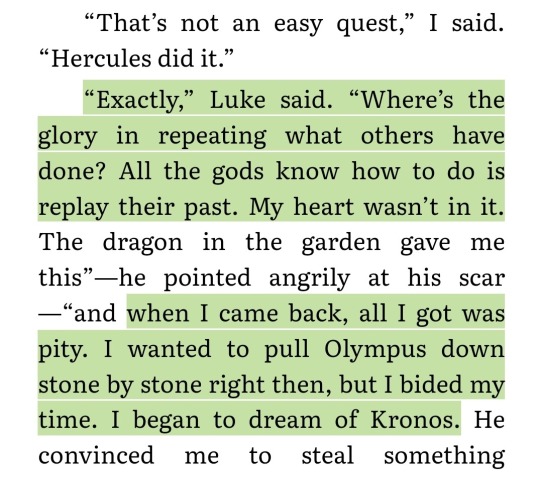
He wanted to pull Olympus down stone by stone because He failed his quest that he didn't want to do because it was already done by Hercules once. 🥴
His endgame has nothing to do with wanting to help ANYBODY. He wanted to take down gods because he had a grudge against them and wanted to Prove that he could do it. Everything else comes secondary if it fits his agenda.
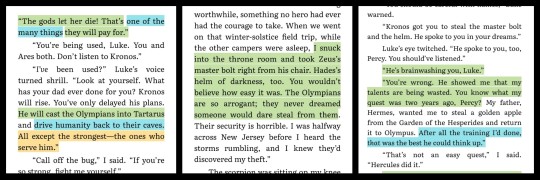
This is one of the reasons why it bothers me so much when people say that Luke had the right idea or that Percy would have joined Kronos if Sally had died like you fundamentally misunderstood the character of Percy if you think he would have joined Kronos.
He talks about "driving humanity back into caves, all except the strongest - who would serve him" THIS IS LITERALLY FASCISM???
(According to Merriam-Webster, Fascism is a political philosophy, movement, or regime that exalts nation and often race above the individual and that stands for a centralized autocratic government headed by a dictatorial leader, severe economic and social regimentation, and forcible suppression)
Now onto the topic of Thalia, Annabeth and Luke
First of all, I absolutely hate that 'Thalia and Luke had a thing before she got turned into a tree bit' because Thalia was 12 and Luke was 14 when they met and Thalia was 15 and Luke was 20-21ish when they meet again in TTC ugh hate that.
Now TTC, where to begin, here I used to believe Luke had already bathed in river Styx as there are some narrations where Percy notes that Luke looked worse and like his scar was reopened and would certainly explain how he survived the cliff fall but on my rereading I realised that Thalia and Luke fought when Percy was holding the sky and Thalia injured Luke so nvm then.
It is however in this book that Luke began to realise Kronos's plan for him as it is implied by the General and he starts to fear for his life.
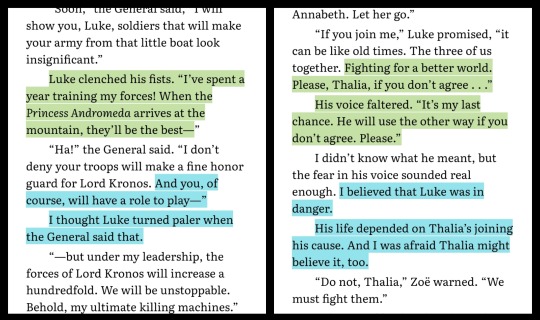
Mind you, what did Luke think would happen if Thalia did agree to join Kronos when he knew Kronos was looking for a host of body...
Luke is many things, he is cunning, manipulative, a great swordsman but what he is not is stupid. If Thalia would have agreed then Kronos would have used Thalia as a vessel 😬
And oh boy the can of worms that is Luke and Annabeth. I've seen many Luke fans/apologists deny that there is no canon evidence of Luke being romantically interested in Annabeth BUT THERE IS?? they refuse to believe and call Annabeth an unreliable narrator because otherwise their uwu white boy would be a Pedophile. Even if he wasn't a Pedo, he manipulated Annabeth so many times to make her sympathise with her and use her emotions against her.
(excerpts from various books: TLO, TLO, BoTL, MoA annabeth's pov)
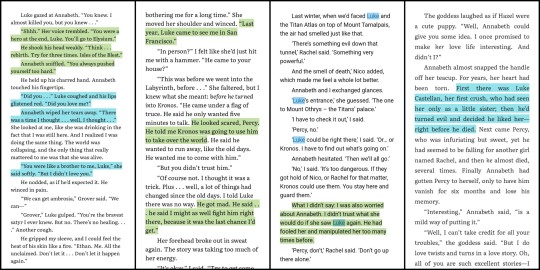
^ Annabeth was 15 almost 16 or already 16 I believe when Luke asked her to run away with him in a romantic sense and he was 21-22.
also another evidence adding to the theory of his fatal flaw having proving himself.
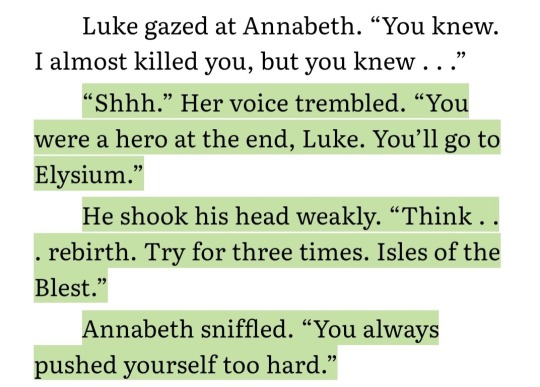
Now, onto the topic of CHB and Luke:
Luke being hesitant to attack camp half blood in BotL has less to do with him suddenly growing a spine (as some fans suggest) and more to do with the inevitable possession.
When Kronos informs that he will himself lead the attack, Luke advises to use Hyperion instead because he knows for Kronos to attack it in person, he would finally possess Luke.
(first one is from TTC, the other two from BoTL)
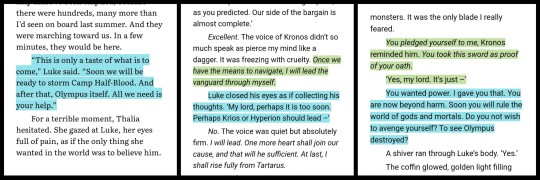
One of the last things I wanna talk about is Silena Beauregard & Luke and Luke's portrayal in the new Percy Jackson series:
Luke was 17 when Kronos started speaking to him and 19 when he left the camp. Silena was 17-18 when she died which makes her 13-14 when Luke left the camp in TLT and 11-12 when Kronos first started talking to him. Adult Luke charmed an underage girl, and promised her that she was helping the demigods and then when she tried to stop, he started blackmailing her. [excerpts from TLO]
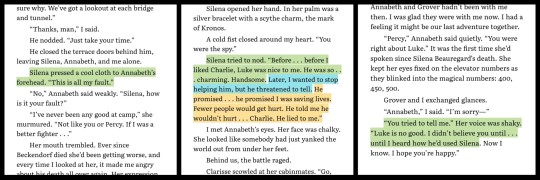
According to the National Society for the Prevention of Cruelty to Children UK, Grooming is when someone builds a relationship, trust and emotional connection with a child or young person so they can manipulate, exploit and abuse them. The relationship a groomer builds can take different forms. This could be: a romantic relationship, as a mentor, an authority figure, a dominant and persistent figure. They might use blackmail to make a child feel guilt and shame or introduce the idea of 'secrets' to control, frighten and intimidate.
So canonically, Book!Luke is a fascist groomer pedophile.
Now on the new Disney+ Percy Jackson show, it seems that Rick Riordan is subtly rewriting the character of Luke and removing the more problematic aspect of him (pedophile and grooming). Let me explain why I think that:
Even though in TLT the book, Luke describes Annabeth as his little sister we know how well that lasted but I don't think they are keeping Annabeth's crush on him on the show from what I've seen (though I could be wrong).
Secondly, the casting of Dior Goodjohn as Clarisse puts Clarisse on the same age range as Luke, maybe a year or two younger but in the first book Clarisse was 13-14 and she was 17 in TLO, so they have aged her up. It is my assumption that they will also age Silena by casting a 17-19 yr old actress as her.
And they have made Luke far more sympathetic in the show than the books (him not calling a hellhound during capture the flag and no pit scorpions in the finale), but we wouldn't know how sympathetic or villainous they are making him until season 2 comes out. Charlie Bushnell gives an excellent performance imo
Though this again reflects the double standards it comes to PJO, they have given much grace and praise for the changes made to Luke's character and little to no complaint for ageing up Clarisse but the hate Walker and especially Leah are given is so cruel. Leah has been so much racially targeted though I think she's an excellent Annabeth, just something to think about.
Also, before I forget-
We don't give enough flack to Rick Riordan for writing two weird age dynamics without recognising as grooming and pedophilic nature. (Lukabeth and Caleo/Capercy)
The characters are never made to realise (especially Annabeth) that an older person having feelings for them as a minor is not a normal behaviour.
Especially in regards to Calypso who may take the form of a 15 year old but is actually more than 4612 (according to the riordan wiki) and her having a crush on 14 year old Percy and 15-16 yr old Leo Valdez, not to mention how rudely she treated Leo. Also her cursing Annabeth because Percy left her. Not only is it plain nasty but she's never called out. Its actually so disgusting🤕.
Anyways this turned into a long rant but I would love to read your opinions, especially on Luke's fatal flaw.
I know for some people it may seem like I'm too hard on him but this is just my opinion.
IMO I have no problem if you like a morally bad or gray person, an antihero or a villain as long as their bad deeds aren't swept under the rug and pretend they never happened or glorify their good deeds.
I actually think villian's bad things make them more interesting.
Luke is an antagonist and a villain of the PJO series and a part of being a villain is that some people are going to hate you and that's ok.
Me personally, I was never a fan of his and that's ok.
I know some people are going to bring up the fact that Percy in MoA sympathises but the PJO characters are complicated and Luke was very skilled at making others think of his reason to destroy the Gods the way they would sympathise the most and we see that multiple times.
#percy jackson meta#percy jackson and the olympians#luke castellan#anti luke castellan#i think#annabeth chase#thalia grace#silena beauregard#clarisse la rue#titans curse#battle of the labyrinth#the last olympian#mark of athena#pjo tv show#percy jackson#percy jackson and the olympians tv show#anti calypso#anti caleo#leo valdez#perseas-wellyboots#rick riordan critical
385 notes
·
View notes